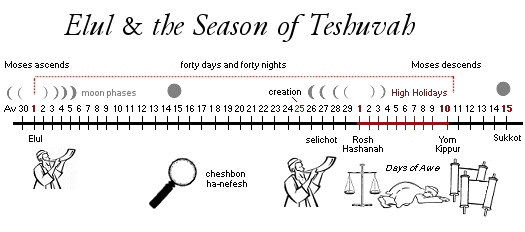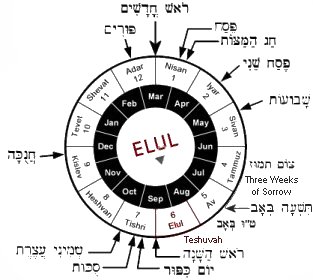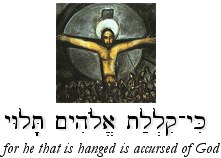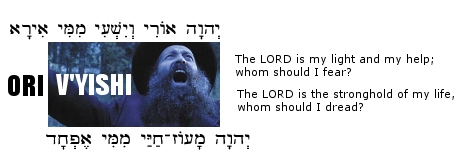|
The Fall Holidays
[ Note: For August site updates, please scroll past this entry.... ]
Preparations for the High Holidays begin a month in advance. This year, the 40-day season of teshuvah (return or repentance) runs from Elul 1 (Aug. 10th) until the end of Yom Kippur (Sep. 19th). Five days after Yom Kippur is the joyous week-long festival of Sukkot ("Tabernacles"), which is immediately followed by the celebration of Simchat Torah. Here is a simple diagram to help you visualize this season of the Jewish calendar:
The following is a list of the fall holiday dates according to the Gregorian Calendar. Note that all holidays traditionally begin at sundown:
- The Month of Elul
When? Aug 10th - Sept 7th

According to Jewish tradition the month of Elul represents the time that Moses spent on Sinai preparing the second set of tablets after the idolatrous incident of the Golden Calf. Moses ascended on Rosh Chodesh Elul and descended 40 days later on the 10th of Tishri, the end of Yom Kippur. The 30 days of Elul are considered a time of selichot (prayers for forgiveness) in anticipation of the Ten High Holy Days (Tishri 1-10). For more, see this page.
Note: It is customary to blow the shofar every day of the month of Elul in anticipation of the High Holidays (see shofar blessings, below). The Selichot service occurs on September 4th, 2010.
- Rosh Hashanah
When? Wed. Sept 8th
Rosh Hashanah (ראש השנה) begins Wednesday, September 8th this year (the seventh "new moon" of the Jewish Year) and ends on Friday, the 10th. According to traditional Jewish thinking, this holiday commemorates the creation of mankind by God. The Mishnah (earlier part of the Talmud) refers to Rosh Hashanah as the "Day of Judgment" (Yom ha-Din) since all of creation owes allegiance to the Creator and is accountable to Him. The Name Elohim (אֱלהִים) revealed in Genesis 1:1 bespeaks God as the Creator and Judge of the universe (the Name YHVH, on the other hand, reveals God's compassion, as the One who intimately relates to humanity and breathes into us the breath of life (Gen. 2:4)). In Jewish tradition on Rosh Hashanah we stand before God as our personal Creator and Judge. Many Messianic Jews believe that the sound of the shofar on Rosh Hashanah is a symbol of the rapture (ἁρπάζω) of the followers of the Messiah.

Note: You can download a free Rosh Hashanah Seder Guide here.
- Yom Kippur
When? Fri. Sept 17th
Yom Kippur begins an hour before sundown on Friday, September 17th, which is a Shabbat this year. It is customary to eat a late afternoon meal with loved ones (called Seudat Mafseket, a meal of cessation), just before the fast begins (the 25 hour fast runs until an hour past sundown on Satuday, September 18th). This is perhaps the most important holiday of the Jewish Year and holds tremendous prophetic significance regarding the Second Coming of Mashiach, the restoration of national Israel, and the final judgment of the world. It is also a day that reveals the High-Priestly work of the Mashiach Yeshua as our Kohen Gadol (High Priest) after the order of Malki-Tzedek (Heb. 5:10, 6:20).

The sound of the shofar at the end of the Yom Kippur minchah (afternoon service) is called gedolah, since it signifies the "sealing of the books" for the coming year.... Yom Kippur prophetically pictures the "Day of the LORD" or the Day of Judgment in Acharit Ha-Yamim (the End of Days).
- Sukkot
When? Wed. Sept 22nd - Wed. Sept 29th
Five days after Yom Kippur marks the start of the seven-day festival of Sukkot (referred to as "Tabernacles" in the Christian tradition). It can be argued that Sukkot is the climax of all the festivals in Scripture.... Everything leads to it as a culmination in God's prophetic plan. Sukkot concludes with an additional holiday called "Shemini Atzeret," on Thursday, September 30th.

Note: The Torah Reading Cycle is suspended for the holiday week of Sukkot as well as for Shemini Atzeret (sometimes referred to as the "eighth day" of Sukkot). Sukkot, Hoshana Rabba, and Shemini Atzeret Torah readings are from Leviticus 22-23, Numbers 29, and Deuteronomy 14-16. These readings detail the laws of all of the mo'edim or "appointed times" on the Jewish calendar and include the mitzvot regarding the festival of Sukkot.
- Simchat Torah
When? Thur. Sept 30th - Fri. Oct 1st
Simchat Torah ("Joy of Torah") immediately follows the festival of Sukkot (Shemini Atzeret evening service). On Simchat Torah we conclude, and begin anew, the annual Torah-reading cycle. First we read the Torah section of V'zot Haberakhah, and then we read the first chapter of Genesis (the beginning of the next Shabbat's Torah reading).
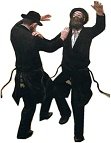
 |
August 2010 Updates
Ten Days of Awe
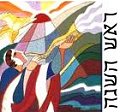
[ The following is intended to help us get ready for Rosh Hashanah (or Yom Teruah), which begins Wednesday, Sept. 8th at sundown... ]
08.31.10 (Elul 21, 5770) According to Jewish tradition, on Rosh Hashanah the destiny of the righteous, the tzaddikim (צַדִּיקִים), are written in the Book of Life (סֵפֶר הַחַיִּים), and the destiny of the wicked, the resha'im (רְשָׁעִים), are written in the Book of Death (סֵפֶר הַמֵּתִים). Most people, however, won't be inscribed in either book, but are given ten days -- until Yom Kippur -- to repent before sealing their fate. If a person turns to God and makes amends to those whom he has harmed, he may be given another year to live in the following (Jewish) year. On the other hand, if he does not repent, then the decree may be given that he will die during the coming year... In other words, though the books are "opened" on Rosh Hashanah, our deeds during the first ten days of the new year will determine whether we are written in the book of life or the book of death. The ten days between Rosh Hashanah and Yom Kippur are therefore accorded special sanctity and are called Aseret Yemei Teshuvah - the "Ten Days of Repentance." These are days that call for sincere personal repentance (i.e., תְּשׁוּבָה, "turning to God") so that the divine decree will be given for our good.... As Abraham Heschel wrote, "No word is God's final word. Judgment, far from being absolute, is conditional. A change in man's conduct brings about a change in God's judgment" (Heschel: The Prophets, 194).
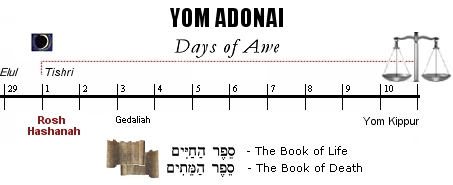 |
As Messianic believers, we maintain that Judgment Day has come and justice was served through the sacrificial offering of Yeshua for our sins (2 Cor. 5:21). He is both the perfect fulfillment of the Akedah of Isaac as well as High Priestly avodah of the Yom Kippur sacrifices. Indeed, Yeshua is the "propitiation" or "expiation" for our sins. The Greek word used in Romans 3:25, 1 John 2:2, and 1 John 4:10 (i.e., ἱλαστήριος) is the same word used in the LXX for the kapporet [cover of the ark of the covenant] in the Holy of Holies which was sprinkled with the blood of the sacrifice on Yom Kippur. "For by one offering he hath perfected for ever them that are sanctified" (Heb. 10:14). Those who are trusting in Yeshua as their Atonement before the Father are thereby declared tzaddikim and their names are written - and sealed - in the Book of Life.
The Day of Judgment for our sinful lives has come in the Person of Yeshua the Mashiach, blessed be He. All those who truly belong to Him are written in the "Lamb's book of life," or Sefer HaChayim (Phil. 4:3; Rev. 3:5; 13:8; 17:8; 20:12, 15; 21:27; 22:19). We do not believe that we are made acceptable in God's sight by means of our own works of righteousness (Titus 3:5-6), but that does not excuse us from being without such works (as fruit of the Holy Spirit in our lives). The Scriptures clearly warn that on the coming Day of Judgment (יוֹם הַדִּין), anyone's name not found written in the Book of Life will be thrown into the lake of fire (Rev. 20:15). "Not every one who says to me 'Lord, Lord' will enter the Kingdom of Heaven, but the one who does the will of my Father who is in heaven" (Matt. 7:21). Moreover, all Christians will stand before the Throne of Judgment to give account for their lives (2 Cor. 5:10). "Every man's work shall be made manifest: for the day shall declare it, because it shall be revealed by fire; and the fire shall try every man's work of what sort it is" (1 Cor. 3:13). Life is an examination, a test, and every moment is irrepeatable. Every "careless" word we utter will be echoed on the Day of Judgment (Matt. 12:36-37). Our future day of judgment is being decided today....
Yom Adonai - the Day of the LORD
The Spring Festivals (Passover, Firstfruits, and Shavuot) have been perfectly fulfilled in the first coming of Yeshua as Mashiach ben Yosef, and the Fall Festivals (Rosh Hashanah, Yom Kippur, and Sukkot) will be fulfilled in His second coming as Mashiach ben David. Since the first advent fulfilled all of the spring mo'edim to the smallest of details, we believe that His second advent portends similar fulfillment as revealed in the fall mo'edim.
After the summer of harvest (John 4:35), the very first Fall festival on the Jewish calendar is Yom Teruah (i.e., Rosh Hashanah), which is a picture of the "catching away" of kallat Mashiach (the Bride of Christ) for the joyful time of the wedding feast and the Sheva Berachot (seven "days" of blessing that follows the marriage ceremony). Then will come the Great Tribulation that culminates in Yom Adonai - the Day of the LORD (יוֹם יְהוָה). The heavenly shofar blast heard at Sinai will be reissued from Zion. First will be the gathering together of those who follow the Mashiach (i.e., those declared tzaddikim because of the merit of Yeshua's sacrifice), and then God's war against Satan and the world system will begin, culminating in the coronation of the King of King of Kings - Melech Malchei Ha-Melachim (מֶלֶךְ מַלְכֵי הַמְּלָכִים).
Rosh Hashanah (or better, Yom Teruah) is therefore a sacred time that has prophetic significance for the Messianic believer, since it commemorates both the creation of mankind by the LORD as well as the "calling up" of the new creation at the behest of Yeshua, when the sound of the heavenly shofar inaugurates the anticipated End of Days (1 Cor. 15:51-54; 1 Thess. 4:15-18). It also prefigures the coming Day of the LORD and Great Tribulation period that marks God's judgment on an unbelieving world...
The King is Coming!

The King is coming, the King is coming! Have you heard the news? We must prepare for His soon arrival! For Christians and Messianic Jews, the month of Elul and the preparation for Rosh Hashanah reminds us to be ready for the soon appearance of Yeshua our LORD. Though we do not know the exact day or hour of His return to possess His kingdom on earth, we are commanded to watch and be ready for His soon appearance. And with the appearance of the Great King will come great judgment. Let's be ready to appear before this awesome King, chaverim, by turning to Him now and trusting in His redemption and love for us... Shanah Tovah!
Personal Update: I have been experiencing an eye problem that is affecting my ability to see/write. Please offer up a prayer for healing. Thank you, chaverim...
Drunk in the Spirit?
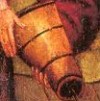
[ On the Q&A forum, someone recently asked what I thought about the phenomenon of being "drunk in the spirit." I am posting my reply here since it might be of interest to you. ]
08.31.10 (Elul 21, 5770) Sometimes people condone the dubious practice of acting "drunk" in the spirit by claiming that the original disciples of Yeshua acted likewise (Acts 2:1-15). But does the Holy Spirit manifest God's Presence in this way? Does the Ruach HaKodesh (רוּחַ הַקּדֶשׁ) produce effects similar to being drunk? In Ephesians 5:18 we read: "Do not get drunk with wine (μὴ μεθύσκεσθε οἴνῳ) in which is debauchery (ἐν ᾧ ἐστιν ἀσωτία), but be filled with the Spirit (ἀλλὰ πληροῦσθε ἐν πνεύματι)." Notice the contrasting conjunction in this verse: "Do not get drunk... but be filled..." Being "under the influence" of wine and under the influence of the Spirit are two entirely different things. The common term is "influence," but the influence of the flesh surely is different than the influence of the spirit...
Notice that the Greek verb for "getting drunk" is μεθύσκομαι (methuskomai), and the word for "debauchery" is ἀσωτία (asotia), a word formed from the prefix a- (not) and sodzo (σῴζω), "to save." This text implies that being drunk resembles the bondage of a life apart from the influence of the Spirit of God. In other words, drunkenness pictures a state of bondage, but being filled with the Spirit gives us the liberty to please God (2 Cor. 3:17).
Paul was not trying to suggest that the actions of spirit-filled follower of Yeshua should resemble those of a person who is intoxicated with alcohol. After all, he could have easily written, "be drunk in the Spirit" (μεθύσκεσθε ἐν πνεύματι), which would have made the common term to be a state of intoxication. No, Paul chose instead to use the verb "filled" (πληρόω), which means to be "filled up" by God's Holy Presence. This is the same verb used when Yeshua said He came to fulfill (πληρῶσαι) the Law and the Prophets (Matt. 5:17).
One of the fruits of the Holy Spirit (פְּרִי הָרוּחַ) is "self control," or "inward strength" (i.e., ἐγκρατής, from ἐν, "in" and κράτος, "strength"). God's Holy Spirit gives us inward strength to be integrated, resolute, and unified in our convictions. "Walk in the Spirit and you will not gratify the desires of the flesh" (Gal. 5:16). The Spirit neither leads us into dissipation nor promotes the fragmentation of the self. Those who are led by the Holy Spirit will evidence the inward character that reflects the character of Yeshua. The fruit of the Spirit (Gal. 5:22) reveals the presence of Yeshua within our hearts (Col. 1:27).
How are we filled with the Holy Spirit? Do we agonize over this and wrestle with God until He pours forth an "additional blessing"? Do we need to be touched by a "specially anointed prophet" from God? No. Just as we were justified freely by God's grace (i.e., salvation), so we are sanctified (Rom. 3:24; 1 Cor. 1:30; Heb. 10:10). Both come entirely through faith... Nonetheless, faith is not something to be "buried in the earth for safe-keeping" (Matt. 25:24-25), but must be lived in order to be profitable. It is up to us whether we will "be filled with the Spirit" (Eph. 5:18). Note that the verb "be filled" (πληροῦσθε) is: 1) present tense (i.e., denoting continuous action), 2) imperative ("you must...), and 3) passive voice (i.e., "you must let yourself be filled"). In other words, you must continually let yourself be filled by the Holy Spirit. It is not a matter of you getting more of the Spirit, but rather of the Spirit getting more of you. God is a "gentleman" - He will not force himself on you, but rather waits for you to yield to Him...
Note: I am not trying to argue that we should be "teetotalers" but simply pointing out that the Scriptures do not teach that a person should ever be "drunk" in the Spirit.... Regarding the issue of abstinence, it is said that "any one who would ascend the holy mountain must be able to draw a line and not cross over it." Only when we are free to say "no" to the impulses of our lower nature may we be said to be free. "When the evil inclination overwhelms your reason and entices you, it steers you toward toward excess, which brings you to ruin and destroys your body. You need to abstain from the things that please and relax you in order to maintain balance" (Bachya Ibn Paquda: Duties of the Heart).
 |
The Anniversary of Creation
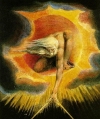
08.30.10 (Elul 20, 5770) Traditional Judaism regards Rosh Hashanah as the date of the Creation of the universe by God (Talmud: Rosh Hashanah 27a), but the Midrash notes that it occurred six days earlier, on the 25th of Elul, when God created the Divine light by saying, "Let there be light" (Gen. 1:3-5). This is the first work of creation (מַעֲשֵׂה-בְּרִאשִׁית) performed by God when He began creating the heavens and the earth. This year, the 25th of Elul occurs on Friday, September 3rd (at sundown), that is, on Shabbat.
The Mishnah (Sanhedrin 38b) states that Adam and Eve were created six days later on Rosh Hashanah (i.e., Tishri 1). But how did the sages determine this date? By transposing the Hebrew letters of the very first word of the Hebrew Scriptures:
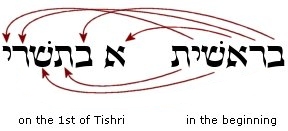
In other words, by rearranging the letters of the word bereshit ("in the beginning"), the phrase aleph b'Tishri ("on the 1st of Tishri") was formed, and therefore this date became associated with the anniversary of creation (or rather, the creation from Adam's perspective, i.e., the "sixth day").
So while technically speaking it is incorrect to regard Rosh Hashanah as the anniversary of creation, it is regarded as the anniversary of the creation of humanity -- the day that God began to rule as King of the Universe (melekh ha-olam). When Adam first opened his eyes and human consciousness was born, he immediately understood that the LORD created all things, including himself. According to midrash, Adam's first words were, "The LORD is King for ever and ever." God then said, "Now the whole world will know that I am King," and He was very pleased. The birthday of humanity is therefore the Coronation Day for the King of the Universe. Psalm 47 celebrates the Kingship of God that mentions the "shout" (teruah) and shofar blast of God's coronation:
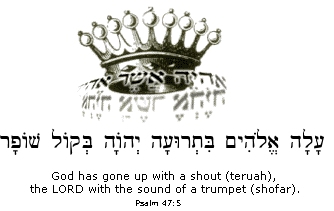 |
The sound of the shofar is meant to awaken our consciousness that the LORD is King of the Universe. As Rambam says, "Wake up from your (moral) sleep. You are asleep. Get up from your slumber. You are in a deep sleep. Search for your behavior. Become the best person you can. Remember God, the One Who created you" (Mishneh Torah). "How blessed are the people who know the joyful sound (teruah), O LORD; they walk in the light of Your Presence" (Psalm 89:15).
Postcript: The LORD God of Israel is a God of order. The appointed times (moedim) were not given to Israel in vain. As Samson Raphael Hirsch once wrote, "The catechism of the Jew is his calendar." Round and round the calendar we go, waiting for God's revelation and will to be fulfilled in us.
Selichot Services

[ This week we have a "double portion" of Torah: Nitzavim ("You are standing") and Vayelech ("and he went"). Moreover, since this coming Shabbat is the last of the Jewish year, many congregations will hold an additional late-night service to offer prayers for forgiveness in anticipation of the High Holidays. ]
08.30.10 (Elul 20, 5770) The Hebrew word s'lichah (סְלִיחָה) means "excuse me!" in colloquial Hebrew, but in the Scriptures it refers exclusively to God's offer of pardon and forgiveness of the repentant sinner. In Psalm 130:4 we read, "But with you there is forgiveness (s'lichah), that you may be feared" (כִּי־עִמְּךָ הַסְּלִיחָה לְמַעַן תִּוָּרֵא).
In Jewish tradition, Selichot (סְלִיחוֹת) is a "technical term" that refers to additional prayers for forgiveness recited during the month of Elul (through Yom Kippur). These prayers and poems for mercy are usually recited before dawn, before the daily shacharit (morning) service. The list of the Thirteen Attributes of God's Mercy (Shelosh Esrei Middot shel Rachamim) are the primary focus of the prayers, based on the Talmud's statement that, "Whenever the nation of Israel sins, let them pray this prayer (i.e., the Thirteen Attributes) and I shall forgive them" (Rosh Hashanah 17b). In general, Selichot services are intended to guide us toward an examination of our lives and to undergo teshuvah.
In Sephardic tradition, Selichot services begin at the start of Elul and run until Yom Kippur (similar to the 40 days Moses spent on Mount Sinai), though in the Ashkenazic tradition they are recited late (i.e., midnight) on the Saturday night prior to Rosh Hashanah (this year, September 4th). Some of the prayers and music for the Selichot service are taken from the services for Rosh Hashanah and Yom Kippur, providing a transition between the "old year" and the New Year. A Chassidic tradition holds that the last twelve days of the year (i.e., Elul 18 to 29) correspond to the twelve months of the closing year: on each of these twelve days, the pentitent should review the deeds and achievements of its corresponding month.
Perhaps you (like me) once learned Psalm 19:7 as, "The Law of the LORD is perfect, converting the soul." The Hebrew text reads, תּוֹרַת יְהוָה תְּמִימָה מְשִׁיבַת נָפֶשׁ, and might better be translated as, "The instruction of the LORD is perfect, returning the soul." Giving heed to the Torah causes our souls to undergo teshuvah, the very theme of Rosh Hashanah and the High Holidays....
Now more than ever, chaverim. We must not put our trust in man or in this moribund world system (κοσμος). We are living in the "end of days." God's judgment has begun in earnest. It is time for us to choose whether we will be shaken or if we will walk in the trust of the LORD God of Israel....
New Hebrew Meditation:
The Time is Now...

08.26.10 (Elul 16, 5770) I wrote a new Hebrew Meditation (The Time is Now) that I hope will encourage you to keep walking with the LORD.... God wants us to be passionately involved with him. He wants lovers - not admirers or mere flatterers. Simply put, God wants all our heart without reservation (Deut. 6:5).
Personal Update: Our 16 month old son Judah is suffering from a bad cold and could use your prayers. He is not sleeping well and that makes it especially hard on Olga. Thank you for your care and love for us, chaverim!

Shabbat Shalom Chaverim! May God's love and Presence compass you about, leading you, following you, and helping you in every way! May you be full of strength and endurance in our precious Lord Yeshua... And thank you all for standing with this ministry. - john
Hebrew Homeschool "Copywork"

08.24.10 (Elul 14, 5770) Studying basic Jewish values (middot) is a wonderful way to reinforce Hebrew learning and to promote Jewish literacy, especially for children (and for new learners of Hebrew). Toward that end, I am beginning to create a sequence of "copywork" pages for young children to practice writing various Hebrew keywords or phrases (you can see a sample here). Hopefully this will help children to learn a little Hebrew while providing parents an opportunity to discuss important moral and spiritual topics with their children. I am also creating some oversized Hebrew Bible verses for children to practice their writing skills (sample page here).
Eventually I might need to create a major site addition devoted to Hebrew homeschool materials. Presently I have added material for Unit One of the Hebrew grammar, and I hope to add more material for Units 2 and 3 soon. Please pray that I will find the time (and energy) to do this, friends... Studying Hebrew is a lifelong pursuit, and the sooner children get comfortable with it, the better!
Other Site Updates. I created a new PDF download of Hebrew Vowel Review Cards and cleaned up portions of the Hebrew Grammar pages. I also added a new page (38 Dishonest Tricks of Arguments) to the "Clear Thinking" section of the site. I hope to add some additional commentary on this week's Torah portion and to add another article on Teshuvah later this week. Shalom for now, chaverim! No fear... stay strong.
 |
Parashat Ki Tavo - כי־תבוא

[ The following entry concerns this week's Torah reading, parashat Ki Tavo. Please read the Torah portion to "find your place" here. ]
08.23.10 (Elul 13, 5770) The Torah reading for this coming Shabbat includes these words: "Because you did not serve the LORD your God with joyfulness and gladness of heart, because of the abundance of all things, therefore [all these curses will come upon you]..." (Deut. 28:47-48). Joy is a prerequisite for serving the LORD, and true happiness is found in the grace He supplies us to do His will. Indeed, the Greek word for joy used in the New Testament (χαρα) is related to the word for grace (χαρις), so there is a profound connection between apprehending grace and experiencing joy (Phil. 4:4).
Sometimes, of course, it is difficult to express joy, especially when we feel oppressed or saddened. The Scriptures never disavow our emotional states (read Psalm 13 or Psalm 88, for example), but an underlying note of grace is always sounded, even in painful moments and times. This is our consolation in suffering.... sorrowful yet ever rejoicing.
And this works the other way, too. Even in our most joyous occasions, such as the great simchah of a wedding, the "glass is shattered" to remind ourselves that our eternal joy is not yet fulfilled... We live in an "already-not-yet" state of existence. Our best moments are beset with shadows; our darkest are limned with hope of the new eternal day to come. As Paul said, "I consider that the sufferings of this present time are not worth comparing with the glory that is to be revealed to us" (Rom. 8:18). May that day dawn for us soon, chaverim...
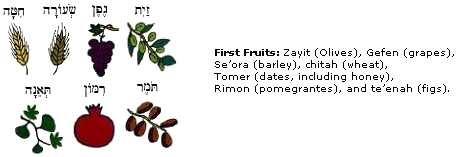
Note: Rosh Hashanah begins in just two weeks! (i.e., Wed., September 8th at sundown). Please read the article on Elul for information about getting ready for this appointed time. And please keep this ministry in your prayers, chaverim. I have been experiencing a lot of spiritual warfare the last couple weeks. Yesterday was nearly insufferable. Thank you....
Haftarah for Ki Tavo
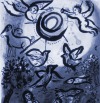
[ The following entry concerns this week's Haftarah reading for parashat Ki Tavo. This is the sixth of the seven haftarot read between Tishah B'Av and Rosh Hashanah that focuses on consolation for Israel in the eschatological future. ]
08.22.10 (Elul 12, 5770) The Haftarah reading for this coming Shabbat describes the future salvation of the nation of Israel. The LORD promises to shine His glorious light upon the Jewish people and to reveal His glory, despite the hour of darkness and tribulation that comes upon the earth:
"Arise and shine (קוּמִי אוֹרִי) for your light has come, and the glory of the LORD (כְּבוֹד יהוה) has risen upon you. For behold, darkness shall cover the earth, and thick darkness the peoples; but the LORD will shine upon you (וְעָלַיִךְ יִזְרַח יהוה), and his glory will be seen upon you (וּכְבוֹדוֹ עָלַיִךְ יֵרָאֶה). And nations shall come to your light, and kings to the brightness of your rising. Lift up your eyes all around, and see; they all gather together, they come to you; your sons shall come from afar, and your daughters shall be carried on the hip" (Isa. 60:1-4).
Sometime during the "plague of darkness" that represents the Great Tribulation (i.e., the Day of the LORD and the judgment of the world), Israel will finally turn to the LORD and receive Yeshua as their long-lost Messiah (Zech. 12:10). The veil will finally be taken away, and all Israel will be saved. The Light of Salvation (Yeshua) will be revealed and the glory of the LORD (כְּבוֹד יהוה) will radiantly shine (זָרָח) upon the Jewish people. The land of Israel will be like Goshen during the times of the plagues of Egypt as the world powers are all judged and destroyed. Then the survivors of the nations will understand that the LORD is indeed with Israel and will turn to Him in surrender as well. "And the glory of the LORD shall be revealed, and all flesh shall see it together, for the mouth of the LORD has spoken" (Isa. 40:5). Yeshua will return to Zion to establish the Kingdom of God upon the earth (Zech. 2:10-13).
(In this connection, it is tragic that most mainstream Christian denominations have fooled themselves into believing that they are the true recipients of ethnic Israel's blessings. In general, these denominations confuse God's plan for the nations (and for Israel) with God's plan for the Church. To verify this statement, check the "ecclesiology" of the largest Christian denominations in the world today. The creeds of Catholicism, Episcopalianism, Methodism, Lutheranism, Presbyterianism, etc., all suppose that the Church constitutes the "true covenant people of God" (i.e., "reconstituted Israel") and that ethnic Israel has therefore been displaced from her privileged position and even relegated to the dust heap of history. Of course theologians of these denominations might not overtly state that the church "replaces" Israel, but their ongoing disregard of the covenantal promises of God to the Jews and their systematic reinterpretation all the prophecies given to Israel suggest otherwise. What is mystifying about all of this is that there is clear teaching on the subject of ethnic Israel from the pages of the New Testament itself. As the Apostle Paul taught, the mystery (μυστήριον) of God's great plan of worldwide salvation includes the future restoration and glory of Israel (see Rom. 11:11-36). The mainline church leaders need to rethink their theological assumptions, especially since the world is fast approaching the Day of Judgment. Yeshua warned "the first will be last, and the last will be first" (Matt. 20:16). God's salvation was first given to the Jews, who were partially hardened (πώρωσις) by the sovereign hand of God so that the blessing of the new covenant might be extended to the Gentiles. This is the "first will be last" aspect. However, the Scriptures are emphatic that the Jewish people will indeed accept God's salvation at the end of the age and the prophetic utterances for ethnic Israel and Zion will be entirely fulfilled. This is the "last will be first" aspect.)
After the Great Tribulation period (i.e., Yom Adonai), Yeshua will establish the Millennial Kingdom on earth and all the exiled Jews will be regathered in Israel. Interestingly, the Jewish sages state that this will involve techiyat ha-metim (תְּחִיַּת הַמֵּתִים), the resurrection from the dead (60:4). In addition, all the surviving nations will flow to land bringing gifts in praise and worship of the God of Israel (60:6-9). Rashi notes that the reference to the "camels of Midian" may allude to the patriarch Joseph who was restored to his father after exile. (In this connection, we see that Yeshua will be disclosed to the Jewish people, though He was disguised from them for a season.) "Those who fly like clouds" may refer to the souls of deceased Jews that are returned to Israel at this time (60:8). The walls of the City of Jerusalem will be rebuilt by other nations and foreign kings will serve God's people and give tribute (60:10). The gates of the city will be open for the wealth of the nations to be poured into Zion, and all the world will be subject to the Messiah's rule (60:11-12). "You shall suck the milk of nations; you shall nurse at the breast of kings; and you shall know that I, the LORD, am your Savior (מוֹשִׁיעַ) and your Redeemer (גּאֵל), the Mighty One of Jacob (אֲבִיר יַעֲקב)." "Violence shall no more be heard in your land, devastation or destruction within your borders; you shall call your walls Salvation (יְשׁוּעָה), and your gates Praise (תְּהִלָּה)."
The Haftarah ends with the vision of the New Heavens and Earth, a place where God's glory will illuminate Zion forever: "the LORD will be your everlasting light, and your God will be your beauty" (60:19-20). This statement recalls Isaiah's earlier prophecy: "The light of the moon will be as the light of the sun, and the light of the sun will be sevenfold, as the light of seven days, in the day when the LORD binds up the brokenness of his people, and heals the wounds inflicted by his blow" (Isa. 30:26). This statement perhaps alludes to the Millennial Kingdom, whereas the prophecy that God Himself will be the Everlasting Light (אוֹר עוֹלָם) pertains to "Heavenly Jerusalem from above" (see Rev. 21:23, 22:5). In either case, the imagery of intense light suggests an increased apprehension of God's Presence. "Now we see through a glass darkly (i.e., in enigmas: αἴνιγμα), but then, face to face" (1 Cor. 13:12). This is the image of eternal comfort, where Zion will be established upon the earth, just as God had always planned. "Your people shall all be righteous; they shall possess the land forever, the branch of my planting, the work of my hands, that I might be glorified... I am the LORD; in its time I will hasten it" (60:21-22).

In short, this glorious haftarah portion describes the salvation of the Jewish people (see Rom. 11:26; Isa. 59:20-21; Jer. 3:17; Ezek. 37:21; 39:25, Hos. 3:5; Joel 3:16, Amos 9:14-15, Mic. 7:15, Zech. 10:12; etc.). There can be no heaven until "all Israel is saved." God has promised Zion to become a praise in all the earth, and He will fulfill His word to the Jewish people. Therefore it is our earnest heart's desire to see Israel "arise and shine" because of the glory of God's salvation given in the Messiah Yeshua.
קוּמִי אוֹרִי כִּי בָא אוֹרֵךְ וּכְבוֹד יהוה עָלַיִךְ זָרָח
ku·mi o·ri ki va or·rekh, ukh·vod Adonai a·la·yikh za·rach
"Arise, shine, for your light has come,
and the glory of the LORD has risen upon you."
(Isa. 60:1)

Hebrew Study Card
God's Faithfulness to Israel
Did you know that the Brit Chadashah (בְּרִית חֲדָשָׁה), or "new covenant," is described in only one place in the entire Old Testament? Here is the relevant passage:
Behold, the days are coming, declares the LORD (יהוה), when I will make a new covenant (בְּרִית חֲדָשָׁה) with the house of Israel and the house of Judah, not like the covenant that I made with their fathers on the day when I took them by the hand to bring them out of the land of Egypt, my covenant that they broke, though I was their husband, declares the LORD. For this is the covenant I will make with the house of Israel after those days, says the LORD: I will put my Torah (תּוֹרָה) into their inmost being and inscribe it upon their hearts; I will be their God, and they will be my people. No longer will they need to teach one another and say to one another, "Heed the LORD"; for all of them, from the least of them to the greatest, shall heed Me -- declares the LORD. For I will forgive their iniquities, And remember their sins no more. (Jer. 31:31-4)
Many Christian theologians stop here and ignore the surrounding context of this passage, namely, the remarkable promise that ethnic Israel would continue to exist as a unique people as long as the laws of nature are in operation:
Thus saith the LORD (יהוה) who gives the sun for a light by day and the ordinances of the moon and of the stars for a light by night, Who stirs up the sea into roaring waves, Whose name is LORD of Hosts (יהוה צְבָאוֹת שְׁמוֹ): If these laws should ever be annulled by Me -- declares the LORD -- only then would the offspring of Israel (זֶרַע יִשְׂרָאֵל) cease to be a nation (גּוֹי) before Me for all time (כָּל־הַיָּמִים). Thus said the LORD: If the heavens above could be measured, and the foundations of the earth below could be fathomed, only then would I reject all the offspring of Israel (זֶרַע יִשְׂרָאֵל) for all that they have done -- declares the LORD. (Jer. 31:35-37)
From this passage -- the only in the Old Testament that explicitly mentions the New Covenant of Yeshua -- it's clear that the continuation and perpetuity of the physical descendants of Israel (zera' Yisrael) is to be reckoned as sure as the very "laws of nature" that are upholding the physical universe. In other words, so long as there is a sun shining during the day and moon and stars during the night, Israel will continue to be a nation (goy) before the LORD for all time (kol-hayamim). Using another analogy, it is as likely for someone to accurately measure the extent of the heavens and earth than it is to suppose that the LORD will cast off all of the seed of Israel. Note especially the last qualifying clause of this verse, "for all they have done," indicating that the unconditional faithfulness of the LORD is not based on the conditional behavior of national Israel.
Have you seen the sun, moon or stars today? If so, you can be assured that the ethnic nation of Israel retains a place in God's plan. The gift and the calling of God is irrevocable (Rom. 11:29). עַם יִשְׂרָאֵל חַי / am Yisrael chai: "The people of Israel live!" Israel is God's "super sign" that He is faithful to His covenant promises. And since God keeps His promises to Israel, Christians can likewise trust that God's sovereign hand works all things together for good -- even if at times things appear bleak and desperate (Rom. 8:28).
כִּי הַיְשׁוּעָה מִן־הַיְּהוּדִים הִיא
ki ha·ye·shu·ah min ha·ye·hu·dim hi
ἡ σωτηρία ἐκ τῶν ᾽Ιουδαίων ἐστίν
"Salvation is from the Jews" (John 4:22)
Addendum: I especially love this haftarah because it clearly proclaims God's faithful love (chesed) for the Jewish people.... One day the LORD will make Zion a praise in all the earth... That is part of the "burden" for this ministry, too: to encourage Christians to rejoice over God's faithful love for Israel: "For Zion's sake I will not keep silent, and for Jerusalem's sake I will not be quiet, until her righteousness goes forth as brightness, and her salvation as a burning torch" (Isa. 62:1). As followers of Yeshua, our prophetic destiny with Israel is linked. Ultiamtely there will be one "olive tree," one flock, and one people of God... God's faithfulness to Israel is directly related to His faithfulness to the church. After all, if God will not keep His covenant promises to ethnic Israel, what makes Christian theologians believe He will keep His promises to the "church"?
For those who read the Scriptures without an anti-Jewish bias, however, it is clear that God's love for Israel is constant and sure. "You who put the LORD in remembrance, take no rest, and give him no rest until he establishes Jerusalem and makes it a praise in the earth" (Isa. 62:6-7). Indeed, when Yeshua read from the Haftarah of Isaiah regarding His ministry to Israel (Luke 4:18-19), he stopped short before reading about Yom Adonai - the day of God's vengeance - and of the future glory of Zion. His ministry was first to come as the world's Redeemer and then to come as Israel's Deliverer. In that coming day, Yeshua will "appoint to them that mourn in Zion, to give unto them beauty for ashes, the oil of joy for mourning, the garment of praise for the spirit of heaviness; that they might be called trees of righteousness, the planting of the LORD, that he might be glorified" (Isa. 61:3).
May that great day come soon, chaverim!
 |
More Hebrew Homeschool Resources

08.20.10 (Elul 10, 5770) Shalom chaverim. I have begun to add some new material for Hebrew Homeschool (Unit 1). Now, in addition to the "trace alphabet," STAM coloring, and handwriting practice pages, your young children can copy some real Hebrew words and phrases to help reinforce their learning. I hope to eventually create a simplified Hebrew dictionary for kids, too.
Presently I have created a "Shalom" page as well as a "Shanah Tovah" page for kids to practice their writing, with more planned soon. My five year old son (Josiah) wants to create his own Rosh Hashanah greeting cards, and these pages will help to spell the words and remember the shapes of the letters.... Let me know if you find these pages helpful.
Shabbat Shalom Chaverim! Thank you for standing with this ministry....
Why then the Law?
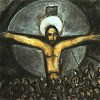
08.19.10 (Elul 9, 5770) Since this week's Torah reading (parashat Ki Teitzei) contains more legal commandments than any other weekly Torah portion, it naturally invites us to revisit the difficult question of whether we are obligated to follow the law of Moses or not. In light of the New Covenant given in Yeshua, just what is our relationship to the lawcode of Moses? In an attempt to respond to this question, I spent a couple days writing a new article entitled "Why then the Law?" that surveys our relationship to the law as followers of Yeshua. I hope you will find this effort helpful and thought provoking, chaverim....
קָדוֹשׁ קָדוֹשׁ קָדוֹשׁ יהוה צְבָאוֹת
מְלא כָל־הָאָרֶץ כְּבוֹדוֹ
ka·dosh ka·dosh ka·dosh, Adonai Tze·va·ot,
me·lo khol ha·a·retz ke·vo·do
"Holy, holy, holy is the LORD of hosts;
the whole earth is full of his glory!"
(Isa. 6:3)
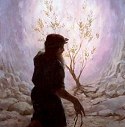
Download Study Card
Hear it sung
Remembering Amalek

[ The following entry concerns this week's Torah reading, parashat Ki Teitzei. Please read the Torah portion to "find your place" here. ]
08.16.10 (Elul 6, 5770) Our Torah portion this week recalls how the ancient tribe of Amalek attacked the Jews when they first left Egypt:
Remember (זָכוֹר) what Amalek did to you by the way, when you came forth out of Egypt; How he met you by the way, and struck at your rear, all who were feeble behind you, when you were faint and weary; and he did not fear God. Therefore it shall be, when the LORD your God has given you rest from all your enemies around, in the land which God gives you for an inheritance to possess, that you shall blot out the remembrance of Amalek from under heaven; you shall not forget (Deut. 25:17-19).
These verses add some details that were left out of the account given in the Book of Exodus (i.e., Exod. 17:8-16). For example, here we learn that Amalek attacked Israel "from the rear," slaughtering the weakest members of the community first. In addition, we are told that Amalek acted with such cruelty because "he did not fear God" (לא יָרֵא אֱלהִים). Nehama Leibowitz writes, "After the Exodus mankind as a whole might have taken one great step further and acknowledged the sovereignty of the God of justice and truth, but then along came Amalek and, unrestrained by the dread and awe that kept all the nations of the world in check, showed the way for the others. What was there to fear? That a people had gone forth from the land of Egypt. Now they were wandering in the wilderness, weary and struggling. Why should they not be attacked? This was the way of the world..." (Leibowitz: Studies in the Parshah). Yes, that's surely "the way of the world" - to bully the weak, to terrorize the righteous, to practice cruelty, and to engage in bloodlust. It is the common approach of nearly all governments in the world and the preferred approach of various religious cults that refuse to truly "fear the LORD...."
God does not want us to forget the attack by Amalek since it symbolizes all subsequent spiritual warfare in the lives of His people. Recall that while the battle raged, Moses (accompanied by Aaron and Hur) went to the top of the hill holding his staff. When he raised his hands in prayer to the LORD, the Israelites prevailed, but once Moses' hands became heavy, the Amakelites prevailed. The battle lasted until sunset, when Amalek was finally defeated. It was an all-day battle, fought in the light.... To commemorate the victory, Moses built an altar and called it, Adonai Nissi (יהוה נִסִּי) - the LORD is my banner (or the LORD is my Miracle), saying, "A hand upon the throne of the LORD (כִּי־יָד עַל־כֵּס יָהּ). The LORD will have war with Amalek from generation to generation" (Exod. 17:16). Moses' outstretched hands were as "a hand upon the throne" of the LORD Himself. Likewise, our victory in the battle against spiritual darkness comes through persistent appeals to the LORD for help...
Just as the Torah commands us to remember (זָכוֹר) the Shabbat to keep it holy (Exod. 20:8); to remember (זָכוֹר) the Passover redemption (Exod. 13:3), and to remember (זָכוֹר) what God did to Miriam (Deut. 24:9), so we are commanded to remember (זָכוֹר) what Amalek did to Israel (Deut. 25:17). To fulfill this commandment, Jewish tradition publicly recites these verses on the Shabbat before Purim (called Shabbat Zachor) so that the 'wiping-out' of Amalek might be connected with the 'wiping-out' of Haman the Agagite, i.e., a descendant of Amalek (Esther 3:1). In addition, it is customary for Jewish soferim (scribes) to literally blot out the name Amalek when they test their quills before writing a Torah scroll....

There is a paradox in the commandment, however, since how can the memory of Amalek be "blotted out" if are commanded to recall it? How it is possible to "remember" something God wants us to forget? After all, if the LORD wanted the Amalekites to be forgotten, then why mention their name? Why should we be commanded to remember Amalek at all?
It should be clear that "Amalek" denotes something more than a particular wicked tribe that attacked the children of Israel. No, Amalek symbolizes the collective "children of darkness" and servants of evil that abound in the world. Historically, Amalek may have been a grandson of Esau and chief of an Edomite tribe (Gen. 36:12, 16), but he is also described as "first among the nations" (רֵאשִׁית גּוֹיִם), even predating the time of Abraham (Gen. 14:7, Num. 24:20). In Augustine's terms, Amalek represents the "City of the World," whereas Israel represents the "City of God." It is in this sense that "Amalek" represents children of darkness in this world, the perpetual enemies to the Kingdom of God: "The LORD will have war with Amalek from generation to generation" (Exod. 17:16).
The name "Amalek" (עֲמָלֵק) begins with the letter Ayin (symbolizing the eye) and equals 240 in gematria -- the same value for safek (סָפֵק), the Hebrew word for doubt. Amalek therefore suggests "the eye of doubt," or even "the severed eye" (the Hebrew verb מָלָק means "to chop" or "sever" in reference to the "eye" of Ayin). Amalek therefore represents spiritual blindness as it acts in the world...
Wiping out Amalek, then, is a call to spiritual warfare, and the weapon of our warfare is the truth of the salvation of God lived out on our lives (2 Cor. 10:4). We must "cast of the works of darkness and put on the weapons (τὰ ὅπλα) of light" (Rom. 13:12). We practice the ministry of reconciliation using "truthful speech, and the power of God; with the weapons of righteousness (τῶν ὅπλων τῆς δικαιοσύνης) for the right hand and for the left" (2 Cor. 6:7). We are to present the use of our bodies to God as "weapons (ὅπλα) for righteousness" (Rom. 6:13). Unlike the doubtful Amalek, the righteous are called to walk in emunah (faith) with ayin ha-tovah ("the good eye") of trust. We are called "children of light" (בְּנֵי הָאוֹר) who walk in the light (John 12:36; Eph. 5:8; 1 Thess. 5:5; 1 John 1:7).
וּבְחַסְדְּךָ תַּצְמִית איְבָי וְהַאֲבַדְתָּ
כָּל־צֲררֵי נַפְשִׁי כִּי אֲנִי עַבְדֶּךָ׃
uv·chas·de·kha tatz·mit oy·ye·vai, ve·ha·a·vad·ta
kol-tzo·ra·rei naf·shi, ki a·ni av·de·kha
"And in your steadfast love you will cut off my enemies, and you will destroy
all the adversaries of my soul, for I am your servant."
(Psalm 143:12)
The Targum Yonatan says, "you shall blot out the memory of Amalek from under the heavens; but of the days of the King Messiah you shall not be unmindful." The commandment to "blot out" Amalek ultimately will ultimately be fulfilled in the Messianic Kingdom to come, "when the LORD your God has given you rest from all your surrounding enemies in the land the LORD your God is giving you as your inheritance to possess" (Deut. 25:19). At that time all memory of Amalek will be "blotted out" from under heaven just as God will "wipe away" all tears from our eyes... This is a glorious truth we should never forget, despite the condition of this world and the apparent upper hand of the "Amalekites."
Meanwhile we are engaged in spiritual warfare and must be armed for the battle. "Since therefore the Messiah suffered in the flesh, arm yourselves (ὁπλίζω) with the same way of thinking" (1 Pet. 4:1). Be sober and vigilant. Put on the whole armor of God, because we wrestle against spiritual forces of evil at work in the world today (Eph. 6:10-18). "Be watchful, stand firm in the faith, act like men (ἀνδρίζω), be strong" (1 Cor. 16:13). In God's power you will "tread upon the lion and cobra; the young lion and the serpent you will trample down" (Psalm 91:13; Luke 10:19). May the LORD help us "stand firm in one spirit, with one mind fighting together (i.e., συναθλέω from συν, "with" and ἀθλέω, "contend," "fight") for the faith of the gospel" (Phil. 1:27). Amen.
 |
Parashat Ki Teitzei - כי־תצא

[ The following entry concerns this week's Torah reading, parashat Ki Teitzei. Please read the Torah portion to "find your place" here. ]
08.15.10 (Elul 5, 5770) The Law of Moses allowed that someone who was to be executed could be hung (or impaled) and exposed "on a tree" (עַל־עֵץ), presumably as a warning others (Deut. 21:22-23). According to the Talmud (Nezakim: Sanhedrin 6:4:3), "a man must be hanged with his face towards the spectators" upon a wooden stake, with his arms slung over a horizontal beam. It should be noted that while this is technically not the same thing as the gruesome practice of Roman crucifixion, reasoning based on this verse was apparently used to justify the execution of Yeshua. The exposed body was required to be buried before sundown to keep the land from being defiled. Besides the shame and degradation of this manner of death, the one so executed would be unable to fall to their knees as a final act of repentance before God, thereby implying that they were under the irrevocable curse of God.
In this connection, we should note that Yeshua was initially charged with blasphemy by the Jewish leaders of His day (Matt. 26:65; Mark 14:64; John 10:33) - an offence that was punishable by stoning (Lev. 24:11-16). However, the provision made in the Law for an offender to be "hung on a tree" was used to justify the sentence of death by Roman crucifixion (Matt. 27:31; Mark 15:13-4; Luke 23:21; John 19:6,15). Note that crucifixion is mentioned elsewhere in the Talmud (Nashim: Yevamot 120b, regarding whether a widow can remarry if her husband were crucified, and Nezekin: Sanhedrin 43a, where Yeshua is said to have been crucified on "eve of Passover") as well as by the Jewish historian Josephus.
The followers of Yeshua understood the connection between this provision in the Torah and the salvation of the LORD. Paul wrote, "Mashiach redeemed us from the curse of the law by becoming a curse for us - for it is written, "Cursed is everyone who is hanged on a tree" (Gal. 3:13). The Apostle Peter also had this in mind when he wrote: "The God of our fathers raised Jesus, whom you killed by hanging him on a tree" (Acts 5:30; cp. Acts 10:39-40); and, "He himself bore our sins in his body on the tree, that we might die to sin and live to righteousness. By his wounds you have been healed" (1 Peter 2:24).
וְהוּא מְחלָל מִפְּשָׁעֵנוּ מְדֻכָּא מֵעֲוֹנתֵינוּ
מוּסַר שְׁלוֹמֵנוּ עָלָיו וּבַחֲבֻרָתוֹ נִרְפָּא־לָנוּ
ve·hu me·cho·lal mi·pe·sha·e·nu, me·du·ka me·a·vo·no·tey·nu,
mu·sar she·lo·me·nu a·lav, u·va·cha·vu·ra·to nir·pa-la·nu
"But he was pierced for our transgressions, he was crushed for our iniquities,
the correction of our peace was upon him, and by his wound we are healed"
(Isa. 53:5)
Teshuvah of the Heart...

[ The following entry continues the subject of teshuvah (repentance). Please read this in connection with earlier entries for the month of Elul, below. ]
08.13.10 (Elul 3, 5770) The month of Elul (אֱלוּל) is sometimes called "the month of love and compassion" (based on the acronym formed from אֲנִי לְדוֹדִי וְדוֹדִי לִי / "I am my beloved's, and my beloved is mine," Song 6:3). This poignant verse alludes to the mystery that God is our Heavenly Groom and we are His betrothed. God is the great Lover of our souls, and the greatest mitzvah of all is to keep faith in His covenant promise of love (Rom. 8:24). Our Beloved is Coming! Yeshua will soon be here, chaverim. Don't miss the Bridegroom's call! Return to the passion of your first love (Rev. 2:4).
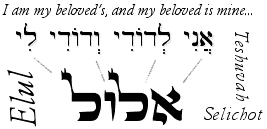 |
Yeshua illustrated the idea of teshuvah (i.e., תְּשׁוּבָה, "returning to God") by telling the story of the "prodigal son" (Luke 15:11-32). After squandering his father's inheritance, a wayward son decided to return home, full of shame and self-reproach. "But while he was still a long way off, his father saw him and was filled with compassion for him; he ran to his son, threw his arms around him and kissed him." The father then ordered a celebratory meal in honor of his lost son's homecoming. When his older brother objected, the father said, "We had to celebrate and be glad, because this brother of yours was dead and is alive again; he was lost and is found."
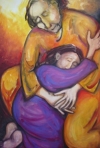
This parable reveals that teshuvah ultimately means returning (shuv) to the compassionate arms of your Heavenly Father... God sees you while you are still "a long way off" (Rom. 5:8). He runs to you with affection when you first begin to turn your heart toward Him. Indeed, God's compassion is so great that He willingly embraces the shame of your sins and then adorns you with "a fine robe, a ring, and sandals." Your Heavenly Father even slaughters the "fattened calf" (Yeshua) so that a meal that celebrates your life may be served....
Why did Yeshua come? He was like the father in the parable who was actively looking for his lost son... He came to "seek and save the lost" (Luke 19:10). Yeshua likened Himself to a shepherd who left his flock to search for one lost sheep, and after finding it, laid the sheep on his shoulders rejoicing (Luke 15:3-7). He also likened Himself to a woman who lost a coin but diligently searched for it. After she found it, she called together her friends and neighbors, saying, 'Rejoice with me, for I have found the lost coin!' (Luke 15:8-10).
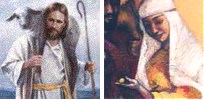
Another image of how God "seeks and saves the lost" is revealed in the metaphor the strong man who rescues hostages. We were held captive by the power of the evil one, but God willingly left the glories of heaven to ransom us from captivity. "He saw that there was no man, and wondered that there was no one to intercede; then His own arm brought him salvation, and his righteousness upheld him" (Isa. 59:16). God then sent His Son to save the world from satan's power (Heb. 2:14; 1 John 3:8). This is the good news of God's salvation: "The Spirit of the Lord God (רוּחַ אֲדנָי יהוה) is upon me, because the LORD has anointed me (מָשַׁח יהוה) to bring news for the poor (לְבַשֵּׂר עֲנָוִים); he has sent me to bind up the brokenhearted (נִשְׁבְּרֵי־לֵב), to proclaim to the captives, liberty (לִשְׁבוּיִם דְּרוֹר), and to the bound ones, release from their chains; to proclaim the year of the LORD's favor" (Isa. 61:1-2; Luke 4:18).
The Strong Man rescued us using a power that evil one could never comprehend, namely, the power of sacrificial love. Yeshua plundered the "strong man's house" through the greater strength of God (Matt. 12:29). This is a power that evil cannot overcome. Yeshua emptied Himself (κενόω) by being clothed in human flesh to die for our sins on a cross (Isa. 53:2-5; Phil. 2:7). In a sense God's "teshuvah" is the Life of His Son, since He turned to us, "looked upon our lowly estate," and saved us from the hand of the oppressor of our souls... In all things - even in teshuvah - Yeshua has the preeminence (Col. 1:8).
What good is teshuvah without genuine hope? If we expect to be rejected or disapproved by God, it's unlikely we will take the first step toward "returning" to Him. Or if we believe we are conditionally accepted, we will "return" in a state of self-justification, like the older son in Yeshua's parable of the prodigal son. In that case we would need to keep a checklist within our minds of all the commandments we've kept. We would reckon our obedience as virtue or merit, and, if we felt any qualms about our service, we would feel obliged to perform extra mitzvot to allay our sense of guilt. Teshuvah would essentially mean preparing a legal defense, arguing that on the basis of our merits we should be accepted before God's Presence. Ultimately such "repentance" amounts to a demand that we be declared righteous, lovable, worthy, etc.
Yeshua's first words of public ministry were "Repent and believe the gospel" (Mark 1:15). The word "repent" is metanao (μετανοέω), meaning "change your thinking," and the word "gospel" means "good news" (i.e., εὐαγγέλιον, from , εὖ- "good," and ἄγγελος, "message"). We could translate the verse as: "Change your thinking and believe the message of God's good will toward you." The good news is that we are to be set free from the curse of the law and the futile efforts of seeking self-justification before Heaven... We no longer need to live in fear of God's conditional acceptance of us (and therefore of our conditional worth). As the Apostle Paul later preached: "Let it be known to you therefore, brothers, that through this man forgiveness of sins is proclaimed to you, and by him everyone who believes is freed from everything from which you could not be freed by the law of Moses" (Acts 13:38-39).
The Jews had known about repentance (teshuvah) for a long time, of course. They understood the rituals and mitzvot that were required to "keep the law," and they even devised legal formulas for "making your defense" before the Almighty (i.e., the Kol Nidre service recited before Yom Kippur: "We exonerate ourselves for failing to keep our word..."). If Moses and the law could have saved us, we wouldn't need to be "declared righteous by God's grace through the redemption in Yeshua" (Rom. 3:24). We wouldn't need the Cross! All we'd need to do is work harder at repentance, perform additional mitzvot, earn merit before Heaven, and so on. But clearly Yeshua meant something other than this when He made the call to "repent."
The repentance Yeshua preached was inextricably connected with the "good news" that He (alone) is God's answer to the problem of our sin. Yeshua was born to die as the divinely appointed Sin-bearer of the world (Heb. 10:5-7). He came to earth and emptied himself (κένωσις) of His regal glory and power in order to be the High Priest (הַכּהֵן הַגָּדוֹל) after the order of Malki-Tzedek (מַלְכִּי־צֶדֶק) and the Mediator of the New Covenant (Heb. 5:6; 9:15; Psalm 110:4; 1 Tim. 2:5). He came to Jerusalem (Moriah) for the explicit purpose of suffering, dying, and being raised from the dead (Matt. 16:21; Luke 9:22). Yeshua died not only for our forgiveness, but also to deliver us from "the law of sin and death" (תּוֹרַת הַחֵטְא וְהַמָּוֶת), i.e., the power that sin holds in our lives. He died to set us free so that we could become the beloved children of God (בְּנֵי אֱלהִים). Yeshua surely was not calling people to become followers of the scribes and Pharisees, who were blind guides and hypocrites (Matt. 23:13-36). He did not want people to become slaves to rituals or religion (1 Cor. 7:23). No, He called people to follow Him: "Take up your cross and follow Me." Turn your thinking around! Die to your religion. Be comforted because there is good news from heaven! God's unconditional acceptance is given to those who trust in the righteousness of Yeshua in place of any self-righteousness that might be gained by performing the "works of the law" (Gal. 2:16, Titus 3:5). Yeshua is "the goal of the law for righteouness" for all who believe (Rom. 10:4-13). Wow. Now that's a message that requires a profound "change of mind" for a "Torah observant" Jew to accept. Dying to the religious project of attaining self-righteousness is to admit the need for radical deliverance from the law itself.
Yeshua's message of salvation was rejected by the religious establishment of His day, just as it is likewise rejected by all other "karma-based" religions and philosophies that believe that "good deeds" are sufficent to earn you a place in heaven... After all, the religious Jews assumed they already understood the requirements for repentance and the means for finding "atonement" with God through the rituals and practices surrounding the High Holidays. Their religion was essentially a meritocracy based on the performance of "good works" (מַעֲשִׂים טוֹבִים) that were thought to impart "zechut" and righteousness to the soul. But Yeshua explained to those "who trusted in themselves that they were righteous" that a person is not justified on the basis of their supposed good deeds or merits, but entirely by appealing to God's compassion and mercy. It was the "despised" tax collector - not the "self-righteous" Pharisee - that left the Temple justified:
Two men went up to the Temple to pray; one a Pharisee and the other a tax collector. The Pharisee stood by himself and prayed thus: 'God, I thank you that I am not like other men, extortioners, unjust, adulterers, or even like this tax collector. I fast twice a week and I give tithes of all that I possess (Amen).' But the tax collector, standing far off, would not lift up so much as his eyes to heaven, but beat his breast, saying, 'God be merciful to me a sinner (Amen).'
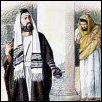
I tell you, this man went down to his house justified rather than the other: for everyone that exalts himself shall be humbled; but he that humbles himself shall be exalted" (Luke 18:10-14).
During this season of teshuvah, we must always remember that the LORD is "for us" and not against us. He died while we were yet sinners (Rom. 5:8). He is the Loving Strong Man who rescued us forever. Nothing can now separate us from the love of God (Rom. 8:31-39). We are literally saved in this hope (Rom. 8:24). May it please the LORD to make us all like Abraham, who "did not misjudge (διακρίνω) the promise of God through unbelief, but was strong in faith, giving glory to God, because he was fully convinced that God was able to do what he had promised" (Rom. 4:20-21). Abraham "rejoiced to see Yeshua's day" and believed: אֱלהִים יִרְאֶה־לּוֹ הַשֶּׂה / Elohim yireh-lo haseh - "God Himself will provide a lamb" (Gen. 22:8; John 8:56).

We have been struggling lately, chaverim. Please keep this ministry in your heartfelt prayers. Thank you, and Shabbat Shalom!
Make up your mind...

[ The month of Elul marks the beginning of a 40 day "Season of Repentance" in preparation for the High Holidays. This year, the month began Tuesday, August 10th at sundown. ]
08.11.10 (Elul 1, 5770) "How long will you go limping between two different opinions? If the LORD is God, follow him; but if Baal, then follow him" (1 Kings 18:21). These words of Eliyahu ha-navi (Elijah the prophet) are meant for us to hear today, at the beginning of this Season of Teshuvah. We are being called to make up our minds (metanoia) and turn (shuv) to the LORD. After all, what is more important to you than your relationship with the LORD God of Israel? Is there anything more important than this?
Our Torah reading this week addresses this very issue: "You must be wholehearted with the LORD your God" (תָּמִים תִּהְיֶה עִם יְהוָה אֱלהֶיךָ) (Deut. 18:13). In the Sefer Torah (i.e., Torah scroll), the first letter of the word tamim ("wholehearted") is written extra LARGE in order to emphasize the importance of the word. Notice also the little word "with" (עִם) that follows in this verse. This hearkens to Micah 6:8: "What does the LORD require of you but to do justice (mishpat), and to love kindness (chesed), and to walk humbly (hatznea lechet) with your God?" Having a humble heart walks with the LORD. Humility begins with the awareness that 1) there is a God and 2) you are not Him.... It is the practice of "knowing before whom you stand" and living your life in light of this fundamental truth.
The word tamim (תָּמִים) means "finished," "complete," or "thoroughly made." For example, tamim is used to describe completed years (Gen. 47:18); healthy animal sacrifices (Lev. 22:21-22); nourishing vines (Ezek. 15:5); truthful speech (Amos 5:10); finished building projects (1 Kings 6:22); and so on. In our relationship with God, tamim means being "blameless" in the sense of being wholehearted, resolute, and entirely committed to walking "with" Him in this world. Psalm 119 begins, "Happy are those whose way is blameless (tamim), who walk in the instruction of the Lord."
אַשְׁרֵי תְמִימֵי־דָרֶךְ הַהלְכִים בְּתוֹרַת יהוה
ash·rei te·mi·mei da·rekh, ha·ho·le·khim be·to·rat Adonai
"Happy are those whose way is blameless, who walk in the teaching of the LORD"
(Psalm 119:1)
Here we see that "walking in the instruction (Torah) of the LORD" is the means by which we are able to walk humbly with God. The study and practice of Torah, then, helps us to become tamim: wholehearted, resolute, and committed to God. Walking in God's truth also makes us happy (i.e., me'ushar: מְאֻשָּׁר, from the verb ashar that means to "walk straight"). As we walk in the truth of God, we begin to experience inner peace and a sense of abiding joy...
The Scriptures state that a "double-minded man is unstable in all his ways" (James 1:8). The word translated "double-minded" is dipsuchos (δίψυχος), a word formed from δίς, "twice" and ψυχή, "soul." The word describes the spiritual condition of having "two souls" that both want different things at once. It is therefore a state of inner contradiction, of having two separate minds holding contradictory thoughts. "How long will you go limping between two opinions?" Notice that the word translated "limping" is posechim (פּסְחִים), from the same root as Passover (i.e., pasach: פָּסַח): How long will you pass from one thing to another? How long will you play "hot potato" with your commitments?
Having a double-mind makes us "unstable in all our ways." Such a cross-eyed approach leads to disorientation and confusion. The Greek word used to describe being "unstable" (ἀκατάστατος) is the same word used to translate being "storm-tossed and not comforted" in last week's Haftarah portion (LXX: Isa. 54:11). The image of a ship being tossed in the sea pictures a state of distress and peril. Interestingly, the description of being "not comforted" is lo nuchamah (לא נֻחָמָה), which comes from the very word translated as "repent" or "regret" (nacham). When we are double-minded, we are "storm tossed" and unable to experience the comfort that comes from genuine repentance. We are like "a wave of the sea that is driven and tossed by the wind" (James 1:6).

On the other hand, singleness of vision concentrates the will and produces wholeheartedness, conviction, stability, inner peace (shalom) and genuine character. As Kierkegaard said, "purity of the heart is to will one thing." "I have set the LORD always before me; because He is at my right hand, I shall not be moved" (Psalm 16:8).
Someone might ask, how do we stop being "double-minded"? This is the essence of the problem, isn't it? How do we stop being of "two minds," experiencing that ambivalence of both wanting and not wanting something? In other words, how do we repent - both in the sense of "changing our minds" (metanoia) and in the sense of practically turning to God (teshuvah)? How do we find that purity of heart that wills one thing?
The antidote for having a "double-mind" is explicitly given in the Scriptures: "Draw near to God and He will draw near to you (ἐγγίσατε τῷ θεῷ καὶ ἐγγιεῖ ὑμῖν), cleanse your hands, you sinners, and purify your hearts, you double-minded" (James 4:8). Note that the verb used in this verse ("draw near!") means to come close enough to touch someone or something. Understood in this light, we are encouraged to come so close to God that we are able to "touch" Him -- and to be touched by Him as well. Drawing near to God is God's way of drawing near to you... In other words, as you draw near to God, He will draw near and touch you.
In practical terms, here are some specific things we can do to "draw near to God so that He will draw near to you." First we can simply pray and earnestly cry out to God for help. The LORD is not indifferent to our suffering and has promised to give us the Holy Spirit to help us. But genuine prayer requires honesty and confession (ὁμολογία), which means agreeing with the truth about your condition. This means, among other things, identifying the ways you have withdrawn from your relationship with God. Indeed, the word homologeo (ὁμολογέω) literally means "saying the same thing" - from ὁμός (same) and λόγος (word). There's little use trying to pretend before God or to rationalize your own double-mindedness before Him. God knows the number of hairs on your head; He surely knows the condition of your heart!
Second, we must vigorously challenge ideas that attempt to seduce us away from the truth and thereby divide our affections. We must learn to take "every thought captive" to Messiah and be on guard for subtle appeals to compromise (2 Cor. 10:5). If we find ourselves in a state of recurring temptation, we must examine the underlying assumptions that are at work in our thinking. If we dig deeper, we are likely to discover that we doubt that God cares for us, or we are fearful that God will not meet our needs. We must therefore counter such assumptions with God's revealed truth, and that means regularly studying the Scriptures to remind ourselves about what is real rather than what is illusory. We then can learn to look at life as it really is - a spiritual world, a "valley of decision," a corridor that irresistibly leads to the world to come. Each soul is on a journey to meet with God for judgment... God does not leave us comfortless. He has promised to never leave nor forsake those who trust in Him. We can set the LORD "always before us" (Psalm 16:8) and walk with Him during our sojourn here in this temporal world.
Third, we can practice our faith by keeping up with Torah study, observing Shabbat (and the other appointed times), enjoying fellowship with other believers, singing to worship music, giving tzedakah, ministering to others in need, etc. These are the mitzvot of our lives, the "works of love" (John 15:12). Our faith is not meant to be a "head trip" or an intellectual exercise: we are meant to live it out in the world. And as we live it, our faith itself becomes strengthened and authenticated. Just as loving others increases - not decreases - the love we ourselves have, so with the practice of faith. The more we believe, the more we receive. The practice of our faith is upbuilding and encourages the inner resolve to be single-minded... "Upon three things the world does stand: upon the Torah and upon worship and upon acts of lovingkindness."
Finally, on a spiritual level what ultimately changes the heart is God's salvation, of course. "It is the Spirit who gives life; the flesh is of no avail" (John 6:63). This salvation is not simply freedom from the penalty of sin but freedom from its power. Often, however, we are slow to realize this, and God allows us to revisit the various "waste places" of our own lusts until we have become sick of ourselves -- "to the bones." We have to be willing "to give up our sickness." Usually that means that we must experience repeated failures until we have "learned from the heart" that the LORD - and the LORD alone - is our Healer and Deliverer. Heartache and despair can lead to "godly grief (λύπη) that leads to genuine repentance in our lives (2 Cor. 7:10).
Ultimately "Salvation is from the Lord," and brokenness of our spirit is God's gift to us... "Blessed are the poor (πτωχός) in spirit." This word pictures someone crouching as a helpless beggar, totally dependent on God for help. If you are struggling, ask God to help you surrender your "heart sickness" to Him.... It's HIS work, not your own, that saves... God alone truly changes the heart. Repentance is a miracle from heaven given to you, personally...
A voice says, "Cry!" And I said, "What shall I cry?" All flesh is grass, and all its beauty is like the flower of the field" (Isa. 40:6). "All flesh is grass" (כָּל־הַבָּשָׂר חָצִיר) - we are here today but gone tomorrow. We have only so many chances to turn to the LORD and make up our minds that we will serve Him. Our Torah portion this week intimates, "man is a tree of the field," i.e., הָאָדָם עֵץ הַשָּׂדֶה, Deut. 20:19). The righteous man is described as a "tree planted by the rivers of water that brings forth fruit in his season" (Psalm 1:3). If you stand in front of a tree to watch it grow, however, you will see nothing. But if you care for the tree, nurture it over time, and provide for its needs, eventually you will see its fruit appear. God gives us each a season to repent, but if that proves fruitless in our spiritual lives, eventually we will be "cut down" (Luke 13:6-9):
"A man had a fig tree planted in his vineyard, and he came seeking fruit on it but found none. So he said to the vinedresser, 'Look, for three years now I have come seeking fruit on this fig tree, but I find none. Cut it down. Why should it use up the ground?' But the vinedresser answered him, 'Sir, let it alone this year also, until I dig around it and put on manure. Then if it should bear fruit next year, well and good; but if not, you can cut it down.'"
As Yeshua also admonished: "Remember (zachar) how you have fallen; repent (metanao) and do the works you did at first. If not, I will come to you and remove your menorah from its place unless you repent" (Rev. 2:5). If you are lukewarm - neither hot nor cold - Yeshua will "spit you out of His mouth" (Rev 3:16). These are sober words that remind us that time is short for us all. Our lives are not our own; we were redeemed at a great cost to God Himself (1 Cor. 6:19-20).

We must decide whether we will serve the LORD or Baal. We must quit "limping between two different opinions." You cannot serve two masters. God wants us to make up our minds. He wants us to declare our loyalty in response to His love. Now is the time. Today is the day. We don't have all the time in the world... May the LORD help us all to wholeheartedly draw near to Him now...
Preparing for Elul

[ The month of Elul marks the beginning of a 40 day "Season of Repentance" in preparation for the High Holidays. This year, the month begins Tuesday, August 10th at sundown. ]
08.10.10 (Av 30, 5770) This evening (at sundow) marks Rosh Chodesh Elul (the "new moon" of the Hebrew month of Elul), which, according to Jewish tradition, was the time when Moses reascended Mount Sinai (the third time) to receive the second set of Tablets from the LORD. Since the tablets were not inscribed until 40 days later (on the 10th of Tishri, the date of Yom Kippur), the days of Elul are considered a time of selichot (prayers for forgiveness) in anticipation of the Ten High Holy Days (Tishri 1-10). For more, see this page.
Beginning on the second day of Rosh Chodesh Elul (and continuing until Erev Rosh Hashanah) the custom is to blow the shofar every day (except on Shabbat). Psalm 27 is often recited every day during this time as well.
The Significance of the Shofar

08.09.10 (Av 29, 5770) In the Scriptures, the shofar (ram's horn) is often used as an instrument of spiritual warfare... For example, the Torah states, "When you go to war in your land against an adversary who is oppressing you, you are to sound an alarm with trumpets; then you will be remembered before the LORD your God and you will be saved from your enemies" (Num. 10:9).
The shofar first brings to mind the ram caught in the thicket by its horns which Abraham sacrificed in place of his son Isaac at Mount Moriah (Gen. 22:13). By extension, this "Ram of God" -- prepared from the "foundation of the world" -- is a picture of substitionary sacrifice of the God's Son for the sins of the world. Indeed, the first occurrence of the word love in the Torah (אהבה, ahavah, in Gen. 22:2) refers to a father's love for his "only" son who was offered as a sacrifice, a clear foreshadowing of the greater "Akedah message" of the Gospel (John 3:16). Note in this connection that the sacrificial redemption involved violent spiritual warfare between God and the Satan (Gen. 3:15). For the believer in Yeshua, the blast of the shofar represents the shout of God's victory (נִצָּחוֹן) over the power of sin and death.

The word shofar (שׁוֹפָר) first occurs in Exodus 19:16 when the Torah was first given to Israel during Shavuot (i.e., "Pentecost"): "On the morning of the third day there were thunders and lightnings and a thick cloud on the mountain and a very loud shofar blast (קל שׁפָר חָזָק מְאד), so that all the people in the camp trembled.... And as the sound of the trumpet grew louder and louder, Moses spoke, and God answered him in thunder." This shofar blast is sometimes called the "first trump" of God.
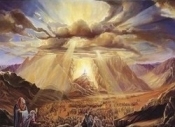
The shofar is also mentioned in connection with both Rosh Hashanah (Lev. 23:24, Num. 29:1) and Yom Kippur: "Then, on the tenth day of the seventh month, on Yom Kippur, you are to sound a blast on the shofar; you are to sound the shofar all through your land" (Lev. 25:9). In later Jewish history, since the shofar was sounded throughout the preceding month of Elul, the blowing of the shofar on the first of Tishri (i.e., Rosh Hashanah) was sometimes called "the last trump," while the shofar blast on Yom Kippur was called the "great trump," since at that time judgment was sealed.
Apart from these purposes, the shofar was also used to sound alarms for the camp of Israel (Num. 10:5-6, Ezek. 33:3), to convene assemblies, to announce the new moon and the Jubilee Year, to herald messages, and to coronate kings. The shofar was also used when Joshua waged war against Jericho (Josh. 6:4-20) and during other military campaigns (Judges 7:22). Indeed, when Israel engaged the enemy in battle, the priests and Levites would first prepare the way by sounding the shofar (2 Chron. 3:12, Neh. 4:14, Jer. 4:19, Amos 2:2, Zeph. 1:6, etc.).
The shofar was also used during worship at the Mishkan (Tabernacle) and Temple. It was sounded when the Ark of the Covenant was returned to the camp (1 Sam. 4:5, 2 Sam. 6:15) and was regularly used as an instrument of praise in the Temple (2 Chron. 15:14, Psalm 47:6, 89:16, 150:5). Blowing the shofar declares that the LORD God is the King of the universe, as it says in Psalm 98:6, "With trumpets and the sound of the shofar (וְקוֹל שׁוֹפָר), shout for joy before the King ADONAI (הַמֶּלֶךְ יְהוָה)." The shofar also signals Israel's glorious redemption during the Day of the LORD (יוֹם־יְהוָה) at the end of the age (Isa. 27:13, Joel 2:1).
Yeshua spoke of the shofar blast from the angels who would "gather together His elect from the four winds, from one end of heaven to the other" (Matt. 24:31). Indeed, Yeshua Himself will blow a shofar on the day of rapture: "For the Lord himself will come down from heaven with a rousing cry, with a call from one of the ruling angels, and with God's shofar; those who died united with the Messiah will be the first to rise" (1 Thess. 4:16). Moreover, at the sound of the "great shofar" (shofar hagadol), the dead will be raised and death itself will be "swallowed up" in victory (1 Cor. 15:51-57).
יוֹם אִירָא אֲנִי אֵלֶיךָ אֶבְטָח / "When I am afraid, I put my trust in you" (Psalm 56:4). This world - olam ha-zeh - is soon coming to an end, chaverim... Although we are tempted to fear the days of testing and tribulation to come, we must find a deeper reason to rejoice. We can anticipate the sound of the heavenly shofar signaling the victory of the LORD over the princes of this age: "The seventh angel sounded his shofar; and there were loud voices in heaven, saying, "The kingdom of the world has become the Kingdom of our Lord and his Messiah, and he will rule forever and ever!" (Rev. 11:15).
During the start of this season of teshuvah it's important to recall that the shofar is also a means of awakening the slumbering soul... Maimonides writes: "There is a hidden message we are supposed to infer by listening to the shofar. It suggests to say: 'Sleeping ones! Awaken from your sleep! Slumbering ones! Awaken from your slumber! Examine your deeds. Remember your Creator and do teshuvah." This idea is echoed in the New Testament writings: "Awake, O sleeper, and arise from the dead, and Messiah will shine on you" (Eph. 5:13-14). This theme of "awakening from sleep" is used elsewhere in the Scriptures (e.g., John 11:11, Rom. 13:11, 1 Thess. 5:6, Dan. 12:1-2, Psalm 78:65, etc.). The sound of the shofar calls us to return to the LORD and seek His face. And since finding God is our greatest joy, King David rightly wrote: "Happy is the people who know the teruah [i.e. the shofar blast]" (Psalm 89:16).
May the LORD God of Israel bless you and keep you and shine His glory upon you for this coming new year! And may you be ready to hear the sound of the heavenly shofar that will call you into His glorious presence soon!
 |
Learn the Shofar Blessing

08.09.10 (Av 29, 5770) I designed a Shofar blessing "Study Card" to help you learn to recite the Hebrew blessing before sounding the shofar. You can download it here.
There are four primary types of shofar blasts:
- Tekiah (תְּקִיעָה) - A long single blast (the sound of the King's coronation)
- Shevarim (שְׁבָרִים) - Three short wail-like blasts (signifying repentance)
- Teru'ah (תְּרוּעָה) - Nine staccato blasts of alarm (to awaken the soul)
- Tekiah ha-Gadol (תְּקִיעָה הַגָּדוֹל) - A great long blast (for as long as you can blow!)
The general custom is to first blow tekiah, followed by shevarim, followed by teruah, and to close with tekiah hagadol.
Parashat Shoftim - שופטים

08.08.10 (Av 28, 5770) The Torah reading for this week is Shoftim ("Judges"), the 48th portion of the Hebrew year. In this parashah we find the only passage in the entire Torah where Moses explicitly identifies himself as a prophet of the LORD. Moreover, this is also the only passage where Moses identifies the coming Messiah as "a Prophet like me" (Deut. 18:15; cp. John 6:14). Read the Torah summary to see how the Lord Yeshua resembled Moses in no less than thirty (30) ways!
Our Torah reading also includes the famous phrase "tzedek, tzedek tirdof" (צֶדֶק צֶדֶק תִּרְדּף): "Justice, Justice you shall purse" (Deut. 16:20). The word tzedek means "righteousness" and involves the duty to adhere to moral truth. The act of charity (called tzedakah) is therefore regarded an obligation rather than as gemilut chasadim (i.e., an act of benevolence). The prophet Isaiah wrote (Isa. 32:17): "The work of righteousness (tzedakah) shall be peace" (וְהָיָה מַעֲשֵׂה הַצְּדָקָה שָׁלוֹם), and added that "the service of righteousness shall be quietness and security forever (וַעֲבדַת הַצְּדָקָה הַשְׁקֵט וָבֶטַח עַד־עוֹלָם).
It is psychologically impossible for us not to judge, since the mind must make distinctions in order to function intelligibly. The Talmud states that when we judge mercifully and in accord with the truth, the Divine Presence joins us, but if we act corruptly, we "push" the Presence away and create a sense of exile. Yeshua told us to "whatever you wish that others would do to you, do also to them, for this is the Law and the Prophets" (Matt. 7:12). As we judge others, so we are judged ourselves. Looking at others from a selfish perspective is therefore a form of "bribery" that blinds us to the truth about righteousness (see Deut. 16:19).
Tzedek, tzedek tirdof also means that justice must be pursued in a just manner. The methods used to obtain justice must themselves be just. The Scriptures therefore do not advocate pragmatism or utilitarian thinking. There are no "noble lies" in the Kingdom of Heaven. Violence (verbal or physical) or deception done in the name of God is always a bad idea. We must execute great restraint and caution when we confront oppression in the world. If you want to change the world around you, begin with yourself....
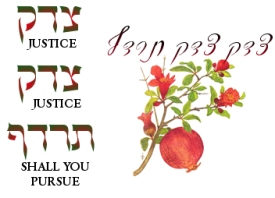 |
Our Torah reading adds, "You must be wholehearted with the LORD your God" (תָּמִים תִּהְיֶה עִם יְהוָה אֱלהֶיךָ) (Deut. 18:13). Notice the little word "with" in this verse (עִם). This verse hearkens to Micah 6:8: "What does the LORD require of you but to do justice (mishpat), and to love kindness (chesed), and to walk humbly (hatznea lechet) with your God?" Having a humble heart walks with the LORD. The word translated "humbly" comes from the same root that gives us the word tzeniut (צְנִיעוּת), meaning modesty or humility. Humility begins with the awareness that 1) there is a God and 2) you are not Him.... It is the practice of "knowing before whom you stand" and living your life in light of this basic truth.
A.W. Tozer wrote: "The humble man will attain a place of soul rest. As he walks on in humility he will be happy to let God defend him. The old struggle to defend himself is over. He has found the peace which humility brings." May it please the LORD to give us all hearts of genuine humility.
Note: This Tuesday (August 10th) at sundown is also Rosh Chodesh Elul ("Head of the Month of Elul"). Rosh Chodesh Elul actually runs for two days since when a Jewish month has 30 days, both the last day of the month and the first day of the coming month function as the "new moon." For more information about the season of Elul -- and the forty days leading up to the High Holidays -- see the chodesh Elul page.
 |
Haftarah for Shoftim
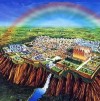
08.08.10 (Av 28, 5770) The haftarah for parashat Shoftim is the fourth of seven selections from the prophets that are read before Rosh Hashanah. These "haftarot of comfort" foretell of the restoration of the Jewish people and of the coming of the Messianic Era. In this week's reading, the LORD promised to personally comfort the Jews and restore the glory of Zion, despite their present suffering and exile:
"It is I, I who comforts you (אָנכִי אָנכִי הוּא מְנַחֶמְכֶם); who are you that you are afraid of man who dies, of the son of man who is made like grass?" (Isa. 51:12).
Despite the destruction of the Temple and their exile into Babylon, the LORD reaffirmed His loyal love for Israel: "I am your LORD .... who will firmly establish you. Say to the inhabitants of Zion, 'You are My people'" (Isa. 51:16). "Speak tenderly to Jerusalem, and cry to her that her warfare is ended, that her iniquity is pardoned, that she has received from the LORD's hand double for all her sins (Isa. 40:2). Though the Jews were punished double for their sins, the time will come when Israel's oppressors will drink the "cup of suffering" which they had forced Israel to drink (Isa. 51:22-23).
Though Isaiah spoke of the return of the Jewish people to Jerusalem after the Babylonian exile, his prophecy extends to acharit ha-yamim (the End of Days) when the Jews will directly see the return of the glory of the LORD. In the verses which precede this week's haftarah, the Jews had challenged God with the following words: "Wake up! Wake up! clothe Yourself with splendor, O arm of the Lord! Wake up as in days of old, as in former ages!... It was you who dried up the sea" (Isa. 51:9-10). God's response to them echoes their words to Him: "Wake up! Wake up! Zion, Clothe yourself with splendor! Put on your beautiful clothes. O Jerusalem holy city" (this phrase is part of Lecha Dodi which is often sung during kabbalat Shabbat). One day Zion will be dressed in celebratory clothing because the Messiah has redeemed Israel:
Hark! Your watchmen raise their voices, Together they shout for joy; for eye to eye they see the return of the LORD to Zion. (Isa. 52:8)
The phrase "eye to eye" (עַיִן בְּעַיִן) indicates that the Jews will look upon the LORD directly in the eye. In that coming day, the veil will be taken away and we will no longer see through a mirror "in riddles" (ἐν αἰνίγματι), but rather panim el panim, "face to face" (1 Cor. 13:12). Therefore the LORD foretells when the spell of despair is broken: "Break forth together into singing, you waste places of Jerusalem, for the LORD has comforted his people; he has redeemed Jerusalem" (Isa. 52:9). On that great day, all the ends of the earth shall see the salvation of our God (יְשׁוּעַת אֱלהֵינוּ).
The haftarah ends with the promise that just as the LORD was with the Jews during their Egyptian captivity and yet brought them out of slavery by His outstretched arm, so one day they will be restored victoriously in Zion (Isa. 52:12).
"For the Lord will comfort Zion (כִּי־נִחַם יהוה צִיּוֹן); He will comfort all her ruins and will make her desert like Eden, and her wilderness like the garden of the Lord. Joy and gladness will be found in her, thanksgiving and the voice of song. (Isa. 51:3)

Teshuvah and the Mind...
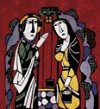
[ The month of Elul marks the beginning of a 40 day "Season of Repentance" in preparation for the High Holidays. This year, the month begins Tuesday, August 10th at sundown. The following entry focuses on the connection between repentance and clear thinking... ]
08.06.10 (Av 26, 5770) Recently I mentioned that the central theme of the High Holiday season is teshuvah (תְּשׁוּבָה), a word often translated as "repentance," though it's more accurately understood as turning (shuv) to God in response to His call. Indeed, teshuvah can mean both these things: turning and answering... A related Hebrew word is nacham (נָחַם), which literally means to "sigh" as a way of expressing regret or sorrow, usually in response to something in the past. Sometimes nacham is used to express the idea of comfort, in the sense of consolation for something lost. The ancient Greek translation of the Bible (i.e., LXX and NT) generally used the word strepho (στρέφω) for the word shuv, and the word metanoia (μετάνοια) for nacham.
In the New Testament, the word metanoia (and its related verb, metanao) is the most commonly used word to express the idea of "repentance." The compound word is formed from 'μετα' (after, with) and 'νοεω' (to think) and generally means "changing your mind" (in the noun form) or "thinking differently" (in the verb form). Since it represents an "afterthought" expressed as regret, metanoia is similar to the idea of nacham in the Hebrew Scriptures. The Greek word strepho, like the Hebrew word shuv, means to "return" to God in a more practical sense, that is, by performing acts of contrition. In either case, however, a change of direction is implied, and that change ultimately begins with how we think and what we regard as truth.
In this connection it is interesting to compare the Shema as it appears in the Hebrew text with the Greek versions given in the New Testament, because the Greek text adds the word "mind" (or understanding) in the recitation: i.e., "Hear, O Israel: The Lord our God, the Lord is one. And you shall love the Lord your God with all your heart and with all your soul and with all your mind and with all your strength." (Mark 12:29-30). Notice that the original Hebrew text does not include reference to the mind, though the word me'od ("muchness") was translated as "power" (δυνάμεώς) in the LXX, and this might have been interpreted to mean the power of the mind. Even so, the Greek New Testament uses the word "strength" (ἰσχύς) for me'od, so the question of how the word "mind" appeared in the recitation of the Shema is still a bit puzzling. (You can view the textual differences here, if you like.) At any rate, it is significant that the word mind or "understanding" (i.e., διάνοια, from διά, "through" + νοῦς, "mind"), appears in the text (as well as in Matt. 22:37 and Luke 10:27), especially when we remember that the word metanoia means "changing your thinking" or "changing your mind."
Yeshua's earthly ministry began with the message, "The time is fulfilled, and the kingdom of God is at hand; repent (μετανοεῖτε) and believe (πιστεύετε) in the gospel" (Mark 1:15). These two verbs (repent, believe) are in the imperative mood. We are commanded to repent, to "change our thinking" and to believe the message of the gospel. As I've said before, trusting in Yeshua is the most important mitzvah of the Scriptures. This implies, among other things, that there is an "ethic of belief," or a moral imperative to accept the truth and reject error in the realm of the spiritual. God holds us responsible for what we think and believe (Acts 17:30-31).
If God holds us responsible to repent and believe the truth of the gospel, He must have made it possible for us to do so ("ought" implies "can"). And indeed, God has created us in His image and likeness so that we are able to discern spiritual truth. He created us with a logical sense (rationality) as well as a moral sense (conscience) so that we can apprehend order and find meaning in the universe He created. All our knowledge presupposes this. Whenever we experience anything through our senses, for example, we use logic to categorize and generalize from the particular to the general, and whenever we make deductions in our thinking (comparing terms, making inferences, and so on), we likewise rely on logic. We have an innate intellectual and moral "compass" that points us to God.
Since we all necessarily must think in order to live, we should value clear thinking. This should be obvious enough, though people often make various errors and misjudgments because they devalue the effort required to carefully think through a question. As William James once said, "A great many people think they are thinking when they are merely rearranging their prejudices." When it comes to questions about the gospel, however, God regards such carelessness to be blameworthy. Again, the LORD holds us accountable for what we think and believe, especially when it comes to the reality and mission of His Son.
The truth about God is always available to human beings, if they are willing to look for it. The Divine Light that was created before the sun and the stars represents God's immanent presence that "lights up" all of creation - including our minds (Gen. 1:3). As Paul stated, "the invisible things of Him from the creation of the world are clearly seen so that people are without excuse" (Rom. 1:19-20). The heavens are constantly attesting to the reality of God's handiwork (Psalm 19:1). All of creation "shouts out" that there is a God. Even small children understand this.
The witness of God's truth is foundational to all of our thinking as well. If you regress far enough in a chain of reasoning, you will always encounter first principles, intuitions, axioms, and "apprehensions" of the laws of thought. This is how language works, or rather, how our mind necessarily discovers truth about reality. For example, the law of contradiction (or identity) is not discovered in experience, but is brought to experience by the operation of the mind. All reasoning is ultimately grounded on foundational first principles that are regarded as self-evident and that are known through the light of the mind itself. Even the pagan Greeks understood this. For instance, Aristotle said that both deduction and induction ultimately were based on the "intuitive grasp" of first principles of thinking itself:
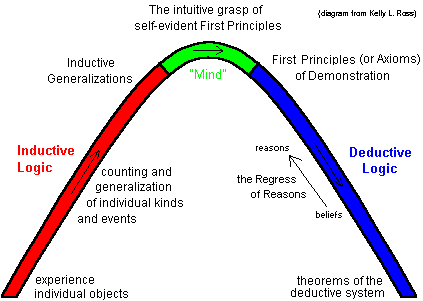 |
It's important to realize that no one "invented" the rules of logic (such as the law of identity, the law of contradiction, valid rules of inference, etc.); no, these are self-evident and presupposed in all forms of intelligible thinking about anything at all. In other words, God created the mind so that true thinking is possible. If you are reading these words, you are presently using logic. You are identifying and combining letters, interpreting their meaning, making connections and comparisons, and therefore making inferences. There is no way to argue that logic is "artificial" or culturally relative. No one can consistently use logic to argue against its universal validity. The revelation (not the invention) of logical first principles is part of God's "signature," if you will, of how the mind is wired to correspond to reality. Reason discovers order in the universe but does not create it ex nihilo. If you deny this, you have opted out of the realm of thought altogether and entered the realm of the absurd.
Likewise we have intuitive awareness regarding the existence of moral truth (i.e., the standard of justice and moral law), aesthetic truth (i.e., ideals of beauty, goodness, worth, and love), metaphysical truth (i.e., cause and effect relationships), and so on. Even scientific truth is based on principles that transcend the discipline of science itself (for example, the assumption that knowledge is "good" and should be obtained is not an empirical statement). The human mind naturally uses these sorts of categories in its thinking all the time, but each of these are ultimately derived from the rational mind of God Himself.
So God made us so that we could discern truth about reality. The mind functions according to logical laws because it is made in the image and likeness of God Himself... God Himself is the ground of all logic, since He created reality and structured the world to be knowable according to its laws. As it is written: "In the beginning was the word/logic (ὁ λόγος), and the λόγος was with God, and the λόγος was God" (John 1:1). God created a world that exhibits order and great beauty. And since human beings were created b'tzelem Elohim, in the image of God, our thoughts (and the words used to formulate our thoughts) as well as our actions are likewise intended to exhibit order and beauty. "For the fruit of light (καρπὸς τοῦ πνεύματος) is found in all that is good and right and true" (Eph. 5:9). Therefore "whatever is true... think on these things" (Phil. 4:8).
The Source of all truth is God. He is the Master of the Universe, the Lord of all possible outcomes and worlds. The heavens declare His glory (outer world) and human beings are made b'tzelem Elohim - in His image (inner world). We are all accountable to Him for our lives, and the irresistible testimony of logic reveals His design and order of reality...

The immanence of the divine Light helps us make sense of Yeshua, who is the "Light of the world" that "enlightens every man who comes into the world" (John 1:9; 8:12). Yeshua said, "the Spirit of Truth ... will bear witness about me" (John 15:26). And again, "For this purpose I was born and for this purpose I have come into the world-- to bear witness to the truth (ἀλήθεια). Everyone who is of the truth listens to my voice" (John 18:37). Heaven and earth might pass away, but the words of Yeshua will never pass away (Matt. 24:35). The life of Yeshua embodies the truth of God (John 14:6).
Again, we are "epistemologically" responsible to walk in the Spirit of truth and to reject what is false (1 John 4:6). This implies that we have a moral and spiritual duty to think clearly and not abuse our minds (Phil. 4:8; Rom. 12:2). God Himself helps us to do this: "I will ask the Father, and he will give you another Helper (παράκλητος, someone "called to one's side"), to be with you forever, even the Spirit of Truth (רוּחַ הָאֱמֶת), whom the world cannot receive, because it neither sees him nor knows him" (John 14:16-17). God gives us the Spirit of Truth so that we can know the truth about His salvation and to "discern what is the will of God, what is good, acceptable, and perfect" (Rom. 12:2). Truth is connected to memory - both in our personal histories as well as the history of God's redemptive actions performed on our behalf. Hence we are constantly commanded to remember what God has done for us. Similarly, the Spirit of Truth brings to remembrance the words of Yeshua to our hearts (John 14:26).
Followers of Yeshua are commanded to love the truth and to think clearly about their faith. The ministry of reconciliation itself is defined as "the word of truth, by the power of God, through weapons of righteousness" (2 Cor. 6:7). Indeed, the word of truth (τὸν λόγον τῆς ἀληθείας) is a synonym for the "gospel of salvation" itself (Eph. 1:13; Col. 1:5; James 1:18). We are saved by Yeshua, who is the "way, the truth, and the life" (John 14:6). God commands all people to believe this truth (Acts 17:30-31; 1 Tim. 2:4). People perish because "they refuse to love the truth and so be saved" (2 Thess. 2:10-12). Therefore we see that the issue of truth is central to salvation itself....
Soldiers are often told chazak v'amatz ("be strong and courageous") before they encounter the dangers of the battlefield, but it's vital to remember that each of us is engaged in a spiritual war every day of our lives. This war is essentially a battle for truth. If we accept false ideas about the nature of reality, we will live in a state of weakness and fear, even if our reasoning otherwise seems sound.
In the Torah we learn that both the Tree of Life (עֵץ הַחַיִּים) and the Tree of the Knowledge of Good and Evil (עֵץ הַדַּעַת טוֹב וָרָע) were present in the original paradise (Gen. 2:9). When Eve listened to the lies of the nachash (serpent) and regarded the forbidden tree as "desirable to make one wise," she immediately began her descent into exile. At the very dawn of human history, then, we see that "truth" (אֱמֶת) apart from God (א) leads to death (מֵת). Adam and Eve's disobedience led to God's gracious promise regarding the coming "Seed" who would restore all things by being victorious in the war for truth (Gen. 3:15). Of course, this promised Seed was Yeshua, our Suffering Servant and "Second Adam," who, through His sacrifice upon the cross, "reversed the curse" and reconciled humanity with God. Note, however, that this "proto-gospel" message also implied perpetual warfare between the heirs of the Messiah (called the "children of light") and the heirs of Satan (called the "children of darkness"). The ongoing enmity between these "two seeds," then, was foretold to be the "tale of two kingdoms," the Kingdom of God (מַלְכוּת אֱלהִים) and the kingdom of the devil (John 8:34-6). The Apostles likewise spoke of "children of darkness" and "children of light" (Eph. 5:8; Col. 1:13, 1 Thess. 5:5, etc.). The children of light are called to be am kadosh - a holy people - separate from the evil engendered by the fallen world and its forces, just as the very first creative expression of God was the separation of light from darkness (Gen. 1:3-4). The children of light "hate evil and love the good," and conversely, the children of darkness "hate the good and love evil" (Psalm 34:21, Prov. 8:13, Amos 5:15, John 3:20-21).
Because false teachers abound in the world, each of us is obligated to test (δοκιμάζω, lit. "determine if a metal is pure") the thinking of others to see if they are truly children of God (1 John 4:1). We must test truth claims. When confronted by false teaching, we are called to "earnestly contend for" (ἐπαγωνίζομαι, lit. "wrestle over") the truth of the faith (Jude 1:3). That's the response to untruth. On the other hand, we are commanded to "always be ready" to provide a reason (λόγος) for the hope that is within us (1 Pet. 3:5). That's the call to be a witness to the truth...
The traditional definition of philosophy is the "love of wisdom" (φίλος + σοφία), and therefore the followers of the Messiah should be philosophers. After all, Yeshua is called the "Wisdom of God" in the Scriptures (1 Cor. 1:24), and we are told that in Him "are hidden all the treasures of wisdom and knowledge" (Col. 2:3). Moreover, we are explicitly commanded to ask God for heavenly wisdom (James 1:5), though this is "not a wisdom of this age or of the rulers of this age, who are doomed to pass away" (see 1 Cor. 2:6-7). Indeed, the gospel message itself is called the power and wisdom of God (1 Cor. 1:21-24). Disciples of Yeshua are to have the "mind of the Messiah" (1 Cor. 2:16)
Genuine repentance implies that we will change our thinking in order to be transformed by God's truth. The follower of Messiah "cannot do anything against the truth, but only for the truth" (2 Cor. 13:8). During this season of teshuvah, may God help us all to think clearly and to turn our thoughts to Him. May He protect us from the vanity of a darkened mind and from all distractions that attempt to seduce us away from Him. May the LORD give us the purity of heart to do His will in the truth. Amen.
Shabbat Shalom, chaverim!
 |
Thoughts about Repentance

[ The month of Elul marks the beginning of a 40 day "Season of Repentance" in preparation for the High Holidays. This year, the month begins Tuesday, August 10th at sundown. The following entry is a bit "technical," but it's important to get our language right when we consider the important issue of what constitutes repentance. ]
08.04.10 (Av 24, 5770) The theme of the Jewish High Holidays is teshuvah (תְּשׁוּבָה), a word often translated as "repentance," though it's more accurately understood as turning back (shuv) to God. The root of this verb occurs nearly 1,000 times in the Hebrew Scriptures and first occurs when God told Adam he would "return to the earth" (Gen. 3:19). In spiritual terms, shuv may be regarded as a practical turning away from evil and a turning toward the good, though Jewish thinking regards turning to God as the means by which we turn away from evil. This act of turning has the power to redirect a person's destiny. It effects the whole life of the soul. As Abraham Heschel wrote, "No word is God's final word. Judgment, far from being absolute, is conditional. A change in man's conduct brings about a change in God's judgment" (Heschel: The Prophets, 194). In the ancient Greek translation of the Jewish Scriptures (i.e., the Septuagint, or LXX), shuv is translated using the word strepho (στρέφω), which means to turn around, or to turn back to God.
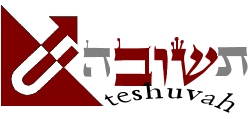
A related word in Hebrew is nacham (נָחַם), which is often associated with the emotion of regret (in the old King James Version of the Bible, nacham is sometimes confusingly translated using the word "repent"). Some linguists suggest that the root idea of the verb pictures God "taking a deep breath" (or even sighing) as way of expressing regret or feeling compassion in response to an offense by others. Thus we read, "And the LORD was sorry that he had made man on the earth (וַיִּנָּחֶם יְהוָה כִּי־עָשָׂה אֶת־הָאָדָם בָּאָרֶץ), and it grieved him to his heart" (Gen. 6:6). Speaking anthropomorphically, God "consoled himself" (nacham also means to comfort) by changing his thinking and plan. God's "regret" was His "answer" or response to the sinful choices of human beings.
Since it is absurd to say that God needs to repent from sin or that He morally regrets His actions, the meaning of nacham must be qualified when it is applied to man. Regret over sin is a state of sorrow that belongs exclusively to morally free human beings. Therefore the prophet Job uttered, "I abhor myself and repent (נחם) in dust and ashes" (Job 42:6). In the ancient Greek translation of the Scriptures, the word nacham was usually translated using the word metanoia (μετάνοια) or sometimes μεταμέλομαι. Metanoia is a compound word that comes from 'μετα' (after, with) and 'νοεω' (to think), which means "changing your thinking," (though it also can mean "going beyond (meta) your thinking" to access the realm of your heart). In other words, the word implies that how we think will affect how we make decisions (judgments), and therefore repentance means acknowledging that we are cognitively mistaken about the nature of reality (i.e., there is a divinely sanctioned moral order, and we are guilty of violating that order and in a state of profound alienation until we are divinely reconciled). Our change of mind - if genuine - inevitably will lead to a change of heart.
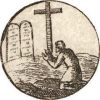
(As an aside, this implies that there is an "ethic of belief," or a moral imperative to believe the truth and reject error in the realm of the spiritual. God has wired us to be rational beings with a moral conscience and an intuitive perception of His reality. He also has revealed himself with "many proofs" (πολλοῖς τεκμηρίοις) that demonstrate the victory of His salvation (Acts 1:3). The greatest mitzvah is exercising faith in God's redemptive love as revealed in the Messiah Yeshua. The LORD is always "calling" to out to you to respond to His Presence...)
The New Testament seems to follow the LXX by using the Greek verb metanao (μετανοέω) to express the Hebrew idea of nacham (i.e., regret or repentance), and it uses the verb strepho (στρέφω) to express the practical idea of shuv (i.e., turning to God and away from evil). Metanao means expressing regret and remorse over the bankruptcy of our personal philosophy of how the world should be run. We surrender to God's truth, forsake the selfish demands of the ego, and "let God be God." Strepho, on the other hand, is a literal or metaphorical turning. When applied to God, it means turning all of your "heart, soul, and strength" back to Him. Indeed, the LXX exclusively uses this word to translate the Hebrew word shuv (שׁוּב), from which we get the word teshuvah. For example, "If you return, O Israel" is אִם־תָּשׁוּב יִשְׂרָאֵל in the original Hebrew, but is translated as ἐὰν ἐπιστραφῇ Ισραηλ in the LXX (Jer. 4:1). Likewise, "Return, O Israel" is שׁוּבָה יִשְׂרָאֵל in the Hebrew but is translated as in the ἐπιστράφητι Ισραηλ in the LXX (Hos. 14:2). In a sense, we can say that nacham/metanao concerns the past (regret), whereas shuv/strepho concerns the present...
Traditional Christian theology tends to regard God in Greek, rather than Hebrew, terms. Historically speaking, most Christian theologians relied on the Greek translation of the Hebrew Scriptures rather than the original Hebrew to develop their theology. Indeed, the word "theology" itself is Greek (not Hebrew) and refers to the "study of God" (θεός + λόγος), implying that God is an "object" that could be looked at, "analyzed," and known as a "thing" or divine "substance." To the ancient Greeks, the idea of God is disclosed through a process of intellectual abstraction -- through "negative theology" (i.e., denying predicates of human language to the divine), and so on. The danger of regarding "repentance" as simply "changing your thinking" is that this can lead to intellectualism that is devoid of inward, heart transformation. Hence Evangelical Christianity has spawned an entire generation of those who accept "easy believism" and who tend to regard "repentance" as intellectual assent to the truths of the Gospel message (or to some creedal formula). Of course correct doctrine is vitally important, but it is emptiness if it is not passionately lived in one's experience. Ultimately, Christian truth is existential rather than academic. Yeshua's passion in the garden is greater than all the most profound thoughts of theology ever penned by the world's greatest theologians...
The general problem with repentance -- whether we regard it as a change of thinking or as a practical call to return to God - is that most people refuse to do it. In fact, no one can repent unless he or she is given the means to do so from heaven (John 6:44). We are born rebels who naturally hate God and His authority (Rom. 8:7). You can argue until you are "blue in face" with a sinner who needs to repent, but unless he or she is truly touched by God, the best possible outcome will be halfhearted resolutions and an incomplete reformation (Luke 11:24-26). Most parents who have children that have turned away from the LORD to embrace a sinful lifestyle know this to be true.... In this connection, repentance is analogous to spiritual rebirth that comes from God's direct intervention. Like genuine faith, the profound change in direction from the principle of self-centeredness to God-centeredness is a miracle from God.
While it is important that we "regret our thinking" (μετανοέω) and embrace the authority of God as the first principle in all our reasoning (λόγος ), it is equally important that we exercise our wills by turning to the LORD (στρέφω) through acts of repentance (e.g., prayer, confession, turning away from sinful practices, offering tzedakah, and so on). According to Jewish tradition, genuine teshuvah involves four basic steps:
Four Steps of Teshuvah:
- Forsake the sin (Prov. 28:13). "Sincere repentance is demonstrated when the same temptation to sin, under the same conditions, is resolutely resisted" (Talmud Yoma 86b). Note that according to traditional Jewish views, the atonement is of no avail without repentance (Midrash Sifra). [shuv/strepho]
- Regret the breach in your relationship with God and others (Psalm 51). [nacham/metanoia]
- Confess the truth and make amends with those we have harmed (Prov. 28:13; 1 John 1:9; James 5:16, Matt. 5:23-4). Note that we must ask for mechilah (forgiveness from others) before receiving selichah (forgiveness from God). [shuv/strepho]
- Accept your forgiveness and move forward with the LORD through faith (Phil. 3:13-14; 1 John 1:9). Be comforted by the Presence of the LORD in your life: Nachumu: "Comfort ye my people" (Isa. 40:1). [nacham/metanoia].
Finally, it needs to be said that authentic repentance is a lifestyle, not a "one time deal." We never get past it. Although there is certainly spiritual progress as we walk in grace, all genuine progress comes through ongoing teshuvah. We may repent from a certain action at a given point in time, but that does not mean that no longer need to do teshuvah. Teshuvah is perpetual and timeless, since it corresponds to our spiritual rather than our temporal lives (i.e., chayei olam rather than chayei sha'ah). Indeed, a true penitent is called baal teshuvah (בַּעַל תְשׁוּבָה), a "master of returning," who is always turning away from self and toward God. We never get beyond the call to "repent and believe the gospel" (Mark 1:15). That is why the season of teshuvah is always timely. The message of Elul and the High Holidays is meant to be carried over throughout the rest of the year.
Teshuvah and confession go hand in hand. Confession (ὁμολογία) means bringing yourself naked before the Divine Light to agree with the truth about who you are. Indeed, the word homologeo literally means "saying the same thing" - from ὁμός (same) and λόγος (word). In Modern Hebrew teshuvah means an "answer" to a shelah, or a question. God's love for us is the question, and our teshuvah – our turning of the heart toward Him – is the answer. Teshuvah is one of the great gifts God gives each of us – the ability to turn back to Him and seek healing for our brokenness. May we turn to Him now!
 |
More About the Month of Elul
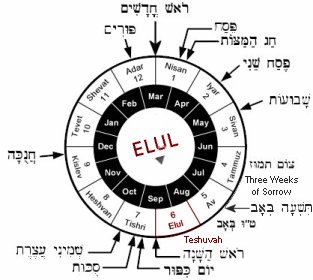
[ The Hebrew month of Elul is traditionally the time to get ready for the coming "High Holy Days." This year, the month begins Tuesday, August 10th at sundown. ]
08.03.10 (Av 23, 5770) Every year the "Season of Teshuvah" runs forty days from the first day of the Hebrew month of Elul to Yom Kippur. During this time we make every effort to repent, or "turn [shuv] toward God." In Jewish tradition, these 40 days are called Yemei Ratzon (יְמֵי רָצוֹן) - "Days of Favor," since it was during this time that the LORD forgave the Jewish nation after the sin of the Golden Calf (Pirke d'Reb Eliezar). Some have likened these 40 days to the number of days it takes for the human fetus to be formed within the womb. Teshuvah is a sort of death and rebirth: a death of the past life and the birth of a new life and a new creation (2 Cor. 5:17). It is an awakening from the sleep induced by sin, and manifests itself as the power of the Holy Spirit working in the heart of the believer who trusts in God's salvation through Yeshua. Therefore the Ruach HaKodesh gives us spiritual life that enables us to be "conformed" (i.e., σύμμορφος, "formed together") with Yeshua's purpose (ratzon) in this world (Rom. 8:28-30). God's Favor is most fully revealed in the character (χαρακτὴρ) of His Son (Heb. 1:3).
Background at Sinai
But why forty days? Do we really need that much time to prepare ourselves to repent and make confession for our sins? Jewish tradition determined that the forty days came from Israel's experience at Sinai (Yeshua also spent "40 days" in the wilderness). According to Rashi, Moses ascended Mount Sinai no less than three times for forty days and nights. The first ascent began on the 6th of Sivan, 50 days after the Exodus, when Moses first received the Ten Commandments and began learning the details of the Torah (this corresponds to the holiday of Shavuot). When he descended and saw the people worshipping the Golden Calf, however, he smashed the tablets (Exod. 32:19). According to tradition, this occurred on the 17th of Tammuz, a date later associated with calamity for Israel. On the following day Moses burned the Golden Calf and judged the transgressors. He then reascended on the 19th of Tammuz and interceded on behalf of Israel for 40 more days (until the 29th of Av), though he descended the mountain without assurance. God then called Moses the following day, on Elul 1, to ascend a third time to receive a new set of tablets. Forty more days and nights were spent receiving the revelation of Torah at Sinai. Moses finally descended on Tishri 10 - Yom Kippur - with the second set of tablets in hand and the assurance of God's forgiveness:

The Forty Days of Teshuvah
According to Jewish tradition, then, the month of Elul represents the time that Moses spent on Sinai preparing the second set of tablets after the idolatrous incident of the Golden Calf. Moses ascended on Rosh Chodesh Elul ("Head of the Month of Elul") and then descended 40 days later on the 10th of Tishri, the end of Yom Kippur, when the repentance of the people was complete. The month of Elul therefore represents the time of national sin and forgiveness obtained by means of teshuvah before the LORD.
Here is a more detailed drawing I made of the forty days that run from Elul 1 to Yom Kuppur:
 |
The Name "Elul"
In the Torah, the month of Elul is simply called the sixth month of the Jewish year. The name "Elul" (אֱלוּל) was "imported" by the Jews after their 70 year exile in Babylon (it is thought to originally come from an Akkadian word meaning "harvest"). Some commentators note that the word may also come from the root of the verb "search" in Aramaic, thus implying that this month should a time of soul-searching or "cheshbon ha-nefesh" (חֶשְׁבּוֹן הַנֶּפֶשׁ).
It is well known that the name Elul is thought to be an acronym for "Ani L'dodi V'dodi Li" - "I am my beloved's and my beloved is mine." In Hebrew:
אֲנִי לְדוֹדִי וְדוֹדִי לִי
a·ni le·do·di ve·do·di li
"I am my beloved's and my beloved is mine" (Song 6:3)

Note that the end of each letter in this phrase is a Yod (י), which has the numeric value of 10, so the phrase itself can be combined to the number 40, reminding us of the forty days of teshuvah that lead up to Yom Kippur.
There are other allusions to the word Elul found in the Scriptures. For example, Deuteronomy 30:6 states that God will circumcise "your heart and the heart of your offspring," or in Hebrew, אֶת־לְבָבְךָ וְאֶת־לְבַב, which is said to be an acronym for the word Elul (אלול). Indeed, the gematria for the Hebrew word is the same for "understanding" (בִּינָה), hinting at Isaiah 6:10: "his heart will understand and turn and be healed." Yeshua circumcises the hearts of those who trust in Him (Col. 2:11). His favor rests upon those who genuinely turn to God. Trusting in His sacrifice on the cross satisfies God's righteous judgment and gives us understanding to fulfill His deeper purposes.
In Exodus 18:7 we read about how Yitro and Moses were reunited after the Exodus and asked about one another's welfare. In Hebrew, the phrase, "And each friend asked of the other's welfare" is וַיִּשְׁאֲלוּ אִישׁ־לְרֵעֵהוּ לְשָׁלוֹם, can be rearranged into an acronym for the word Elul (אלול). This allusion has led to the custom of inquiring about the welfare of family and friends during this season, and the practice of sending "Shanah Tovah" cards wishing them a sweet and good New Year.
Psalm 27 - the High Holidays Psalm
It is a custom to sing or read the Book of Psalms during the month of Elul. In the famous Song of Moses, it is written: וַיּאמְרוּ לֵאמר אָשִׁירָה לַיהוָה / "and they spoke, saying: 'I will sing to the LORD' (Exod. 15:1). This phrase can be formed into an acronym for Elul, and the sages therefore reasoned that hearing the Psalms were vital during the Season of Repentance and Days of Favor.
Of all the Psalms, however, Psalm 27 is considered central one of the season, however. The midrash on the Psalms states that the word ori (אוֹרִי), "my light," refers to Rosh Hashanah (based on Psalm 37:6) whereas the word yishi (יִשְׁעִי), "my salvation," refers to the atonement given on Yom Kippur. King David also mentions that God would hide him in his sukkah (בְּסֻכּה) in the time of trouble, referring to the holiday of Sukkot (Psalm 27:5). Since all three of these holidays are alluded to in this Psalm, Psalm 27 is regarded as the key Psalm for the Fall Holidays of the Jewish year.
יְהוָה אוֹרִי וְיִשְׁעִי מִמִּי אִירָא
יְהוָה מָעוֹז־חַיַּי מִמִּי אֶפְחָד׃
Adonai o·ri ve·yish·i, mi·mi i·ra
Adonai ma·oz chai·yai, mi·mi ef·chad
"The LORD is my light and my salvation; whom shall I fear?
The LORD is the stronghold of my life; of whom shall I be afraid?" (Psalm 27:1)

Download Study Card
Finally, Psalm 27:13 contains a textual oddity. It is often translated: "Unless I had believed to see the goodness of the Lord in the land of the living." The word often translated "unless" is lulei (לוּלֵא), which read backwards spells Elul (אלול). This is said to suggest that salvation comes from faith that sees the goodness of the LORD. Repentance is only really possible if we believe in the goodness and love of the Lord "in the land of the living."
Chodesh Elul - חדש אלול

[ The Hebrew month of Elul is the time to prepare for the "High Holy Days." This year, the month begins Tuesday, August 10th at sundown. ]
08.02.10 (Av 22, 5770) The Hebrew month of Elul is the sixth month of the Biblical calendar (late summer/early fall), the month set apart for repentance, or teshuvah, in spiritual preparation for the High Holidays (i.e., Rosh Hashanah and Yom Kippur). If you were to count from Tishri as the first month of the calendar (as the Rabbinic tradition does), Elul would be the last month of the year -- a time to make "New Year's Resolutions" and to turn away from sin before the start of the New Year. The month of Elul is therefore a time each year to prepare for the Yamim Nora'im, the Days of Awe, by getting our spiritual house in order. In traditional Judaism, then, the "Season of Teshuvah" begins on Elul 1 and ends 40 days later, on the Day of Atonement (i.e., Yom Kippur).
The following appeal from the prophet Isaiah is considered thematic for this season:
דִּרְשׁוּ יְהוָה בְּהִמָּצְאוֹ קְרָאֻהוּ בִּהְיוֹתוֹ קָרוֹב׃
dir·shu Adonai be·him·matz·o, ke·ra·u·hu bi·yo·to ka·rov
Seek the LORD while he may be found;
call upon him while he is near (Isa. 55:6)

Download Study Card
The passage continues: "Let the wicked man forsake his way (i.e, derekh: דֶּרֶךְ), and the perverse man his thoughts (i.e., machshavah: מַחֲשָׁבָה); and let him return (i.e., shuv: שׁוּב) to the LORD, that He may have compassion (i.e., rachamim: רַחֲמִים) on him, and to our God, for he will abundantly pardon (i.e., selichah: סְלִיחָה)" (Isa. 55:7).
Some of the sages say that the sin of refusing to do teshuvah is worse than the actual sin itself, since the sin was committed at a time when you were overcome by your evil inclination, but now you can look back dispassionately over your actions in confession and remorse (Psalm 32:5; James 5:16; 2 Cor. 13:5). Teshuvah means "answering" to God regarding the truth of your condition. If we genuinely return to the love of our Heavenly Father, we will hate our sins because they were acts of treason against His love.
How many "Rosh Hashanahs" will there be in your life? How many opportunities for you to return to the LORD? The Talmud says, "Repent one day before you die." But who knows the day of one's death in advance? Therefore live each day as if it were to be your last, and "seek the LORD while He may be found; call upon Him while He is near."
This year, Rosh Chodesh Elul begins Tuesday, August 10th at sundown. Beginning the second day of Rosh Chodesh Elul (i.e., Aug. 11th) and continuing to the day before Rosh Hashanah (i.e., Sept. 7th), it is customary to blow the Shofar every day (except on Shabbat). Many people also recite Psalm 27 every day during this time as well.
 |
Parashat Re'eh - ראה

[ The following entry concerns this week's Torah reading, parashat Re'eh. Please read the Torah portion to "find your place" here. ]
08.01.10 (Av 21, 5770) This week's parashah (Re'eh) begins with the portentous words: "See (רְאֵה), I give before you today a blessing and a curse" (Deut. 11:26). Note that the word re'eh is singular ("you see!"), whereas the following pronoun is plural ("before you today"). The sages note that singular form of the verb (i.e., "you see!") is used here to stress that although Torah is freely given to all "who have ears to hear," it's our own personal responsibility to "choose life" and walk its message out in our lives (Deut. 30:19). This has traditionally been understood to mean that God gives each of us the path of goodness (that leads to blessing) and the path of wickedness (that leads to curse). The path we are are choosing, in other words, is ultimately our own choice...
An undisputed maxim of the Talmud is: "All is in the hands of God except the fear of heaven (yirat shamayim)" (Berachot 33b; Niddah 16b). In other words, though God constantly showers the world with grace and light, He does not "force" us to revere His Presence but rather leaves that choice with us. God could overwhlem us all so that we had no choice but to see and fear Him, but He "withdraws" Himself and restrains His influence in our lives so that we can exercise faith. The Hebrew word for seeing (ראה) and the word for fearing (ירא) share the same root. We cannot genuinely "choose life" apart from personally seeing it, but we cannot see it apart from the reverence of God. The reverence of God sanctifies our perception and enables us to see clearly. Therefore the righteous "walk by faith, not by sight" (2 Cor. 5:7).
Since our lives are part of a greater whole, we must understand that every deed we do brings to the world around us either a blessing or a curse.... But before we rush out to "bless" the world, however, we must first take pains to undergo self-examination (Matt. 7:5, 2 Cor. 13:5, Gal. 6:3-4). From a place of humilty and an awareness of our own frailty are we able to genuinely help others. As Rabbi Israel Salanter once said, "When I was young, I wanted to change the world. I tried, but the world didn't change. So I decided to change my town, but my town didn't change. Then I resolved to change my family, but my family didn't change. Then I realized that I first had to change myself." (I would add, "but then I realized that I couldn't change even myself, so I cried to the LORD for a new heart and He answered my plea...")
The LORD "brings us into the land" in order to serve Him and others in grace and love. The commandment to practice tzedakah (charity) and shemitat kesafim (the forgiving of debts) are intended to promote a dignified society of people that care for one another as mishpachah (family). Thus are we called to be am segulah - a treasured people - forming a community of chesed (love) and beauty for the glory of our Messiah (1 Pet. 2:9).
 |
Haftarah for Parashat Re'ev

[ The following entry concerns this week's Haftarah reading for parashat Re'eh. ]
08.01.10 (Av 21, 5770) The weekly haftarah portion (reading from the Prophets) is usually connected with the weekly Torah portion. However, beginning from the 17th of Tammuz until the end of the Jewish year, the connection changes. First three haftarot of rebuke are read during the "Three Weeks of Sorrow" (between the 17th of Tammuz and Tish'ah B'Av), and then seven haftarot of comfort (Shiva D'Nechemta) follow until the end of the year (i.e., until Rosh Hashanah). These seven selections from the prophets foretell the restoration of the Jewish people to their land (the ingathering of the exiles), the future redemption of Israel, and the coming of the Messianic Era.
The haftarah for Parashat Re'eh is the third of the seven "haftarot of comfort." It begins:
"O afflicted and storm-tossed one, and not comforted,
Behold, I will set your stones in fair colors,
and lay your foundations with sapphires" (Isa. 54:11).
Nearly all of the Jewish commentators relate this promise of coming comfort to Jerusalem. The Targum Yonatan says, "the walls about which the nations of the world said that you would never be comforted, the LORD says, "I will lay its foundation with diamonds."
God will fulfill the promise of the New Covenant to Israel: "All your children shall be taught by the LORD, and great will be the peace of your children" (Isa. 54:13). In the coming Millennial Kingdom, Israel shall dwell securely, free from oppression. Unlike Nebuchadnezzar who was commissioned to bring judgment from the LORD, the enemies of Israel (Gog/Magog) will have no divine sanction and therefore be utterly defeated before the appearance of Yeshua the Mashiach. "No weapon that is fashioned against you shall succeed, and you shall confute every tongue that rises against you in judgment. This is the heritage of the servants of the LORD and their vindication from me, declares the LORD" (Isa. 54:17).
The LORD then invited the Jews to drink freely from the waters of life. "Incline your ear, and come to me; hear, that your soul may live; and I will make with you an everlasting covenant (בְּרִית עוֹלָם), my steadfast, sure love for David (Isa. 55:3; Luke 1:68-75; Acts 13:34). Radak understands this to refer to the time of the Messiah, when the everlasting kindness (chesed) that the LORD showed to David will be revealed in the greater Son of David. The Messiah is the witness (עֵד) to the peoples, a leader (נָגִיד) and commander for the peoples (Isa. 55:4). He will cause the nations of the earth that survived the Great Tribulation to come to Zion because of the glory God has bestowed upon the Jewish people (Isa. 55:5).
 |
|
|


























